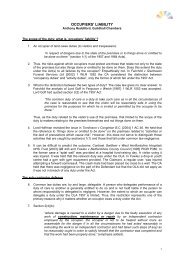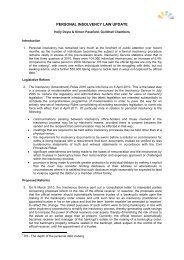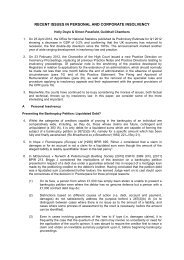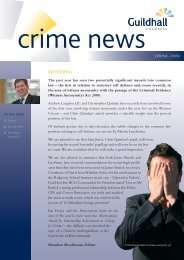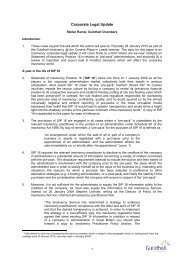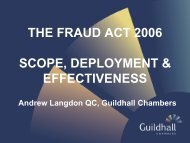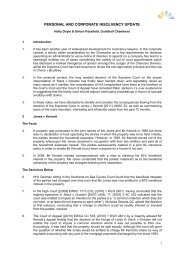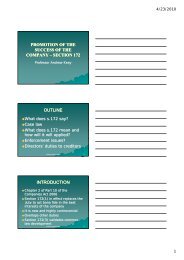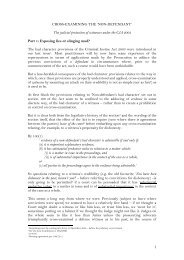liability of insolvency practitioners for the legal costs of litigation
liability of insolvency practitioners for the legal costs of litigation
liability of insolvency practitioners for the legal costs of litigation
Create successful ePaper yourself
Turn your PDF publications into a flip-book with our unique Google optimized e-Paper software.
LIABILITY OF INSOLVENCY PRACTITIONERS FOR THE LEGAL COSTS OF<br />
LITIGATION<br />
Chief Registrar Baister<br />
Stephen Davies QC, Guildhall Chambers<br />
Insolvency legislation and <strong>litigation</strong> <strong>costs</strong><br />
1. Whilst it is <strong>of</strong>ten described as a “statutory code”, <strong>the</strong> <strong>insolvency</strong> legislation is not an exhaustive<br />
code. Principles such as comity, <strong>the</strong> rule against double pro<strong>of</strong> and <strong>the</strong> rule in ex parte James are<br />
nowhere addressed. In a similar way, <strong>the</strong>re are no statutory provisions expressly referring to <strong>the</strong><br />
law and practice relating to <strong>the</strong> <strong>liability</strong> <strong>of</strong> <strong>insolvency</strong> <strong>practitioners</strong> <strong>for</strong> <strong>the</strong> <strong>litigation</strong> <strong>costs</strong> <strong>of</strong> a<br />
successful defendant. As an example, where a liquidator adopts and proceeds unsuccessfully to<br />
trial with a claim in <strong>the</strong> name <strong>of</strong> <strong>the</strong> company, <strong>the</strong> adverse <strong>costs</strong> awarded against <strong>the</strong> company<br />
will be af<strong>for</strong>ded super-priority ahead <strong>of</strong> <strong>the</strong> statutory expenses <strong>of</strong> <strong>the</strong> liquidation. This judgemade<br />
rule does not appear in <strong>the</strong> statutory code. It is an elephant trap <strong>for</strong> <strong>of</strong>fice-holders unaware<br />
<strong>of</strong> it because, <strong>of</strong> course, it trumps any rights <strong>of</strong> <strong>the</strong> <strong>of</strong>fice-holder to be paid his remuneration out<br />
<strong>of</strong> <strong>the</strong> estate – <strong>the</strong>reby indirectly rendering <strong>the</strong> <strong>of</strong>fice-holder liable <strong>for</strong> an adverse <strong>costs</strong> order<br />
made against <strong>the</strong> company.<br />
Risks <strong>of</strong> undertaking <strong>litigation</strong><br />
2. In 1997 Sir Gavin Lightman gave two addresses in which he emphasised <strong>the</strong> special nature <strong>of</strong><br />
<strong>insolvency</strong> <strong>litigation</strong> and <strong>the</strong> need <strong>for</strong> caution be<strong>for</strong>e an IP makes a decision to embark upon it :<br />
a. his lecture given to SPI (now R3) on 6 March 1997 entitled: “Evidence in Insolvency<br />
Proceedings” 1 ;<br />
b. his speech given to <strong>the</strong> Institute <strong>of</strong> Advanced Legal Studies on 11 December 1997<br />
entitled: “Office holders’ charges – cost control and transparency” 2 .<br />
3. In his December address, Sir Gavin <strong>of</strong>fered detailed guidelines to <strong>of</strong>fice-holders in relation to <strong>the</strong><br />
minimisation <strong>of</strong> exposure to <strong>litigation</strong> <strong>costs</strong> under <strong>the</strong> following sub-headings :<br />
A Alternatives to <strong>litigation</strong><br />
(1) ADR<br />
(2) Assignment and financing<br />
B. Reduction <strong>of</strong> risk and cost <strong>of</strong> <strong>litigation</strong><br />
(1) Conditional fee agreement<br />
(2) Selection and remuneration <strong>of</strong> solicitors and counsel<br />
(3) Prudent control <strong>of</strong> <strong>litigation</strong><br />
4. The justification <strong>for</strong> such guidelines is also <strong>the</strong> premise <strong>of</strong> this paper. Sir Gavin referred to: “[<strong>the</strong>]<br />
enormous risks <strong>of</strong> undertaking <strong>litigation</strong>”. He explained <strong>the</strong> self-evident proposition that, in <strong>the</strong><br />
position <strong>of</strong> a prudent businessman holding funds on behalf <strong>of</strong> o<strong>the</strong>rs, an <strong>of</strong>fice-holder: “is<br />
concerned, where <strong>litigation</strong> cannot reasonably be avoided, to limit his financial risk and, in<br />
particular, his risk as to <strong>costs</strong>.” So what are <strong>the</strong> risks<br />
1<br />
Reproduced in Insolvency Intelligence (1997) Vol 10, no.4 at pp.25-8<br />
2<br />
Reproduced in Insolvency Intelligence (1998) Vol 11, no.1 at pp.1-6<br />
1
The basic principle – when <strong>the</strong> <strong>of</strong>fice-holder is defendant/respondent<br />
5. Although <strong>the</strong>re is little in <strong>the</strong> statutory code which directly addresses <strong>the</strong> <strong>liability</strong> <strong>of</strong> an <strong>of</strong>ficeholder<br />
<strong>for</strong> <strong>litigation</strong> <strong>costs</strong> <strong>the</strong>re is one special rule which perhaps deserves an early mention<br />
because it is an exception. Rule 7.39 directly protects an IP against <strong>litigation</strong> <strong>costs</strong> when he is<br />
made party to proceedings. Be<strong>for</strong>e looking at <strong>the</strong> rule, <strong>the</strong> historical context is as follows.<br />
6. In many <strong>of</strong> <strong>the</strong> reported cases where an <strong>of</strong>fice-holder (usually a liquidator) was a defendant,<br />
orders were made that <strong>the</strong> successful applicants’ <strong>costs</strong> be paid directly out <strong>of</strong> <strong>the</strong> assets <strong>of</strong> <strong>the</strong><br />
company. When a liquidator is sued, and loses, <strong>the</strong>re is a distinction between <strong>the</strong> role <strong>of</strong> <strong>the</strong><br />
court which hears <strong>the</strong> action deciding that <strong>the</strong> winner should have his <strong>costs</strong> paid, and <strong>the</strong> court<br />
which conducts <strong>the</strong> administration <strong>of</strong> <strong>the</strong> liquidation deciding whe<strong>the</strong>r those <strong>costs</strong> should be<br />
allowed from <strong>the</strong> fund. However, one factor tended to differentiate <strong>the</strong> situation where a liquidator<br />
was a defendant from <strong>the</strong> situation where <strong>the</strong> liquidator was a plaintiff. It arose from a<br />
fundamental principle which equity courts used (and continue to use) in deciding questions <strong>of</strong><br />
<strong>costs</strong> in actions <strong>for</strong> <strong>the</strong> administration <strong>of</strong> estates. That principle is stated in Daniell's Chancery<br />
Practice, 7th ed (1901), Vol 1 (at 987):<br />
“As a general rule, wherever an estate or fund is administered by <strong>the</strong> Court, <strong>the</strong> <strong>costs</strong> <strong>of</strong> all<br />
necessary and proper parties to <strong>the</strong> proceedings are a first charge upon it, and must be<br />
defrayed <strong>the</strong>reout be<strong>for</strong>e <strong>the</strong> claims <strong>of</strong> <strong>the</strong> persons beneficially entitled <strong>the</strong>reto are satisfied.<br />
But <strong>the</strong> <strong>costs</strong> only <strong>of</strong> those proceedings which were in <strong>the</strong>ir origin properly directed <strong>for</strong> <strong>the</strong><br />
benefit <strong>of</strong> <strong>the</strong> estate will be ordered to be thus paid; and <strong>the</strong> <strong>costs</strong> <strong>of</strong> any unnecessary and<br />
useless proceedings must be paid by <strong>the</strong> person at whose instigation <strong>the</strong>y were taken.”<br />
7. When a liquidator was sued as such, he did not instigate <strong>the</strong> <strong>litigation</strong>, had no real choice about<br />
whe<strong>the</strong>r to take part in <strong>the</strong> <strong>litigation</strong>, and in <strong>the</strong> vast majority <strong>of</strong> cases in opposing <strong>the</strong> <strong>litigation</strong> he<br />
was seeking to protect <strong>the</strong> fund. Thus, <strong>the</strong> working through <strong>of</strong> <strong>the</strong> principle articulated by Daniell<br />
meant that nearly always any <strong>costs</strong> which a liquidator was ordered to pay as a consequence <strong>of</strong><br />
losing such <strong>litigation</strong>, would be a charge on <strong>the</strong> fund. It was because this principle concerning<br />
payment <strong>of</strong> <strong>costs</strong> out <strong>of</strong> a fund existed that it could be an appropriate order, even in a case<br />
where <strong>the</strong> court ordered a liquidator to be removed, <strong>for</strong> <strong>the</strong> <strong>costs</strong> <strong>of</strong> <strong>the</strong> application <strong>for</strong> his<br />
removal to be paid from <strong>the</strong> fund.<br />
8. In Re London Metallurgical Company [1895] 1 Ch 758 (at 763), Vaughan Williams J said that <strong>the</strong><br />
<strong>costs</strong> <strong>of</strong> litigants who successfully bring proceedings against a liquidator: “ ... are to be paid out<br />
<strong>of</strong> <strong>the</strong> assets <strong>of</strong> <strong>the</strong> company. That is <strong>the</strong> general rule, though under exceptional circumstances<br />
an order may be made going beyond that and giving <strong>the</strong>m <strong>the</strong> right to be paid by <strong>the</strong> liquidator<br />
personally”.<br />
9. In proceedings where a liquidator is sued as such, <strong>the</strong> proceedings are being brought in <strong>the</strong><br />
court which has administrative control <strong>of</strong> <strong>the</strong> liquidation. This is because, when <strong>the</strong> liquidator is<br />
being sued as such, <strong>the</strong> relief sought is that he be required to carry out some particular task in<br />
<strong>the</strong> administration <strong>of</strong> <strong>the</strong> liquidation — <strong>for</strong> example to admit a pro<strong>of</strong> <strong>of</strong> debt, or remove someone<br />
from a list <strong>of</strong> contributories. When it is <strong>the</strong> court which has administrative control <strong>of</strong> <strong>the</strong> liquidation<br />
which is hearing <strong>the</strong> <strong>litigation</strong>, it can short circuit <strong>the</strong> two steps <strong>of</strong> deciding, as an incident <strong>of</strong> <strong>the</strong><br />
power to hear <strong>the</strong> <strong>litigation</strong>, who should bear those <strong>costs</strong>, and <strong>of</strong> deciding, as an incident <strong>of</strong> <strong>the</strong><br />
administration, whe<strong>the</strong>r indemnity <strong>for</strong> those <strong>costs</strong> should be allowed from <strong>the</strong> estate, and make<br />
an order directly that <strong>the</strong> <strong>costs</strong> <strong>of</strong> <strong>the</strong> successful litigant be paid from <strong>the</strong> assets <strong>of</strong> <strong>the</strong> company.<br />
10. There<strong>for</strong>e, it might be argued that <strong>the</strong> appropriate <strong>for</strong>m <strong>of</strong> order to give effect to <strong>the</strong> principle that<br />
<strong>the</strong> successful applicants’ <strong>costs</strong> against <strong>the</strong> liquidator should be paid out <strong>of</strong> <strong>the</strong> assets <strong>of</strong> <strong>the</strong><br />
company is an order against <strong>the</strong> liquidators personally, but one which limits <strong>the</strong>ir personal <strong>liability</strong><br />
to <strong>the</strong>ir entitlement to be indemnified from <strong>the</strong> assets <strong>of</strong> <strong>the</strong> company. Moneys <strong>the</strong> liquidators<br />
are liable to pay under such a <strong>costs</strong> order are an expense in <strong>the</strong> winding-up and <strong>the</strong>re<strong>for</strong>e rank<br />
ahead <strong>of</strong> remuneration. Thus, if <strong>the</strong>re are available assets to pay remuneration, but not to pay<br />
general creditors, <strong>the</strong> liquidators would not be entitled to pay <strong>the</strong>mselves remuneration and <strong>the</strong>n<br />
say <strong>the</strong>y had no <strong>liability</strong> to <strong>the</strong> applicants under <strong>the</strong> <strong>costs</strong> order because <strong>the</strong>re were no remaining<br />
assets.<br />
2
11. Against that common law background, rule 7.39 provides:<br />
7.39 Award <strong>of</strong> <strong>costs</strong> against <strong>of</strong>ficial receiver or responsible <strong>insolvency</strong> practitioner<br />
“Without prejudice to any provision <strong>of</strong> <strong>the</strong> Act or Rules by virtue <strong>of</strong> which <strong>the</strong> <strong>of</strong>ficial receiver is<br />
not in any event to be liable <strong>for</strong> <strong>costs</strong> and expenses, where <strong>the</strong> <strong>of</strong>ficial receiver or a<br />
responsible <strong>insolvency</strong> practitioner is made a party to any proceedings on <strong>the</strong> application <strong>of</strong><br />
ano<strong>the</strong>r party to <strong>the</strong> proceedings, he shall not be personally liable <strong>for</strong> <strong>costs</strong> unless <strong>the</strong> court<br />
o<strong>the</strong>rwise directs<br />
12. This provision applies equally to an application brought by ano<strong>the</strong>r party to which <strong>the</strong> trustee is<br />
joined as a necessary party (see Re Mordant [1995] 2 BCLC 647). In that case, Sir Donald<br />
Nicholls V-C indicated <strong>the</strong> approach <strong>of</strong> <strong>the</strong> court to r.7.39 as follows :<br />
“I do not think <strong>the</strong>se factors lead to <strong>the</strong> conclusion that it would be right to depart from what<br />
r.7.39 indicated is to be <strong>the</strong> starting point regarding <strong>costs</strong> orders against respondent trustees<br />
in bankruptcy, namely, <strong>the</strong>re is no personal <strong>liability</strong> unless, in effect, <strong>the</strong>re is good reason to<br />
direct o<strong>the</strong>rwise. In my view this is not a case <strong>for</strong> me to direct o<strong>the</strong>rwise.”<br />
13. This is without prejudice to <strong>the</strong> o<strong>the</strong>r provisions in <strong>the</strong> Act or Rules by which <strong>the</strong> Official Receiver<br />
or trustee are not liable <strong>for</strong> <strong>costs</strong> in any event (e.g. 6.105(6), 6.132(4), 6.142(5), 6.177(2)).<br />
The basic principle – when <strong>the</strong> <strong>of</strong>fice-holder is applicant/claimant<br />
14. Where ann <strong>of</strong>fice-holder makes an application or brings a claim, he is not af<strong>for</strong>ded <strong>the</strong> same<br />
immunity from an order <strong>for</strong> <strong>costs</strong> should it fail. In Re Wilson Lovatt & Sons Ltd [1977] 1 All ER<br />
274 (at 285), Oliver J explained that an <strong>of</strong>fice-holder is not in a special position relating to <strong>costs</strong><br />
when he institutes court proceedings in his own name :<br />
“I cannot at <strong>the</strong> moment see why it should be contended that a liquidator who takes it on<br />
himself to institute proceedings, to bring parties be<strong>for</strong>e <strong>the</strong> court, to subject <strong>the</strong>m to <strong>costs</strong>, and<br />
as against whom it is quite clearly established that no order <strong>for</strong> security can be made, should<br />
<strong>the</strong>n be entitled to plead that he is not responsible beyond <strong>the</strong> extent <strong>of</strong> <strong>the</strong> assets in his<br />
hands. I can see no reason at all why a liquidator should be entitled to an immunity which is<br />
not conferred on o<strong>the</strong>r litigants. A trustee or a personal representative who initiates<br />
proceedings no doubt has a right to indemnity out <strong>of</strong> <strong>the</strong> estate which he represents but, if he<br />
litigates, he litigates at his own risk and so, in my judgment, it should be with <strong>the</strong> liquidator ...”<br />
15. The implications are obvious. No <strong>of</strong>fice-holder would wish to be <strong>the</strong> subject <strong>of</strong> <strong>the</strong> following<br />
observation <strong>of</strong> Chadwick LJ in Walker v Walker [2005] EWCA Civ 247, [2006] 1 WLR 2194:<br />
“23. The stance adopted on behalf <strong>of</strong> <strong>the</strong> liquidator is that it is perfectly proper to bring<br />
proceedings against a defendant <strong>for</strong> a claim which can never be met having regard to <strong>the</strong><br />
assets available to meet it; to pursue that claim until all those assets have been expended by<br />
<strong>the</strong> defendants in defending that claim, perfectly properly; and <strong>the</strong>n to walk away on <strong>the</strong> basis<br />
that <strong>the</strong> defendants are left to bear all <strong>the</strong>ir own <strong>costs</strong>. If that is what <strong>the</strong> law permits or<br />
requires, <strong>the</strong>n I am bound to say I find that startling.”<br />
16. The application <strong>of</strong> <strong>the</strong> “ordinary” rules on <strong>costs</strong> to applicant//claimant IPs is addressed below.<br />
The Insolvency Rules and <strong>the</strong> CPR<br />
17. As to <strong>the</strong> application <strong>of</strong> <strong>the</strong> CPR to <strong>insolvency</strong> proceedings, see generally r. 7.51 Insolvency<br />
Rules 1986:<br />
“(1) The CPR, <strong>the</strong> practice and procedure <strong>of</strong> <strong>the</strong> High Court and <strong>of</strong> <strong>the</strong> county court<br />
(including any practice direction) apply to <strong>insolvency</strong> proceedings in <strong>the</strong> High Court and<br />
3
county court as <strong>the</strong> case may be, in ei<strong>the</strong>r case with any necessary modifications, except so<br />
far as inconsistent with <strong>the</strong> Rules.”<br />
18. As to <strong>costs</strong> specifically Chapter 6 <strong>of</strong> Part 7 <strong>of</strong> <strong>the</strong> Third Group <strong>of</strong> Parts <strong>of</strong> <strong>the</strong> Insolvency Rules<br />
1986 applies. Rule 7.33 Insolvency Rules 1986 provides:<br />
“Subject to provision to inconsistent effect made as follows in this Chapter, CPR Part 43<br />
(scope <strong>of</strong> <strong>costs</strong> rules and definitions), Part 44 (general rules about <strong>costs</strong>), Part 45 (fixed<br />
<strong>costs</strong>), Part 47 (procedure <strong>for</strong> detailed assessment <strong>of</strong> <strong>costs</strong> and default provisions) and Part<br />
48 (<strong>costs</strong> special cases) shall apply to <strong>insolvency</strong> proceedings with any necessary<br />
modifications.”<br />
19. Thus <strong>the</strong> normal CPR rules as to <strong>litigation</strong> <strong>costs</strong> apply in <strong>insolvency</strong> (<strong>the</strong> key provisions <strong>of</strong> which<br />
are included in <strong>the</strong> schedule) to <strong>the</strong>se notes).<br />
20. The main points to note are:-<br />
a. <strong>the</strong> general rule that <strong>the</strong> loser pays <strong>the</strong> winner (44.3(2));<br />
b. <strong>the</strong> possible regard to <strong>the</strong> conduct <strong>of</strong> <strong>the</strong> parties both be<strong>for</strong>e and during <strong>the</strong><br />
proceedings (44.3(4)(a) & (5));<br />
c. <strong>the</strong> possibility <strong>of</strong> awarding <strong>costs</strong> on an issue basis (44.3(4)(b), (5)(b) & (6)(f));<br />
d. <strong>the</strong> possible regard to any payment into court or Part 36 <strong>of</strong>fer (44.3(4)(c)); and<br />
e. <strong>the</strong> ability <strong>of</strong> <strong>the</strong> court to award partial <strong>costs</strong> (44.3(4)(b) & (6)).<br />
21. However, none <strong>of</strong> <strong>the</strong>se points detracts from <strong>the</strong> overriding discretion. As Lloyd LJ said in Taylor<br />
v Pace Developments Ltd [1991] BCC 406 (at 408):<br />
“[T]here is only one immutable rule in relation to <strong>costs</strong>, and that is that <strong>the</strong>re are no immutable<br />
rules”.<br />
Refusal to engage in ADR may be relevant as to conduct. In Halsey v Milton “[T]here is only one<br />
immutable rule in relation to <strong>costs</strong>, and that is that <strong>the</strong>re are no immutable rules”.<br />
22. Keynes General NHS Trust [2004] EWCA Civ 576, [2004] 4 All ER 920 CA, <strong>the</strong> court held that<br />
<strong>the</strong> burden was on <strong>the</strong> losing party to show why <strong>the</strong> usual <strong>costs</strong> order should not be made. It was<br />
submitted that refusal to agree to ADR was a factor to be taken into account. The court held that<br />
it was necessary to show that a party had acted unreasonably in refusing to agree to ADR.<br />
Relevant factors to be taken into account were:<br />
a. <strong>the</strong> nature <strong>of</strong> <strong>the</strong> dispute;<br />
b. <strong>the</strong> merits <strong>of</strong> <strong>the</strong> case;<br />
c. <strong>the</strong> extent to which o<strong>the</strong>r means <strong>of</strong> settlement had been attempted;<br />
d. whe<strong>the</strong>r <strong>the</strong> <strong>costs</strong> <strong>of</strong> ADR were disproportionate;<br />
e. whe<strong>the</strong>r delay in ADR would have caused prejudice;<br />
f. whe<strong>the</strong>r ADR had a reasonable prospect <strong>of</strong> success.<br />
23. The court may award <strong>costs</strong> on two bases, <strong>the</strong> standard basis and <strong>the</strong> indemnity basis (see<br />
schedule below).<br />
Costs consequences <strong>of</strong> discontinuance<br />
24. Where a claimant discontinues an action he is liable <strong>for</strong> <strong>the</strong> defendant’s <strong>costs</strong> incurred up to <strong>the</strong><br />
date <strong>of</strong> service <strong>of</strong> <strong>the</strong> notice <strong>of</strong> discontinuance unless <strong>the</strong> court orders o<strong>the</strong>rwise (see CPR Part<br />
38.6(1) and Part 44.12(1)(d)). The claimant bears <strong>the</strong> burden to show that some o<strong>the</strong>r order <strong>for</strong><br />
<strong>costs</strong> should be made. There are only limited circumstances in which <strong>the</strong> court should depart<br />
from <strong>the</strong> usual order (In re Walker Wingsail Systems plc; Walker v Walker [2005] EWCA Civ 247,<br />
[2006] 1 WLR 2194).<br />
4
25. In Re Southbourne Sheet Metal Co Ltd Nourse LJ dealt with an exception to <strong>the</strong> general rule as<br />
to <strong>costs</strong> in circumstances such as <strong>the</strong>se, considering,<br />
“Ano<strong>the</strong>r [exception to <strong>the</strong> ordinary rule]…is where a successful defendant has so<br />
conducted himself, <strong>for</strong> example by withholding his true defence when he has had an<br />
opportunity to disclose it, as to encourage <strong>the</strong> plaintiff to bring or continue his action”<br />
(250 B).<br />
26. Potter LJ held in RTZ Pension Property Trust Ltd v ARC Property Developments Ltd [1999] 1 All<br />
ER 532 that <strong>the</strong> general rule on discontinuing proceedings applied,<br />
“unless good reason could be shown to <strong>the</strong> contrary. The nature <strong>of</strong> that good reason<br />
will vary according to <strong>the</strong> <strong>for</strong>m <strong>of</strong> order which <strong>the</strong> plaintiff seeks” (541 f).<br />
27. That <strong>the</strong>re is a discretion is clear from, <strong>for</strong> example, <strong>the</strong> judgment <strong>of</strong> Lightman J in RGB<br />
Resources plc (in liquidation) v Rastogi [2005] EWHC 994 (Ch), [2005] BCLC 592 (at [53]):<br />
“The question however arises whe<strong>the</strong>r <strong>the</strong> conduct <strong>of</strong> [<strong>the</strong> fourth defendant] and <strong>the</strong><br />
attitude which he adopted in negotiations <strong>for</strong> settlement af<strong>for</strong>ds a good reason to<br />
depart (in whole or in part) from <strong>the</strong> normal rule. CPR 44.3 requires <strong>the</strong> court in<br />
exercising its discretion as to <strong>costs</strong> to have regard to <strong>the</strong> conduct <strong>of</strong> <strong>the</strong> parties and<br />
admissible <strong>of</strong>fers to settle made by <strong>the</strong> parties […] His unnecessarily aggressive<br />
approach in <strong>the</strong> <strong>litigation</strong> has been calculated to increase <strong>costs</strong>. […] It seems to me<br />
that <strong>the</strong> totally unreasonable and unjustified stance adopted by [<strong>the</strong> fourth defendant]<br />
is a good reason to order that [he] should be deprived <strong>of</strong> a proportion <strong>of</strong> his <strong>costs</strong>.”<br />
28. A liquidator is in no better position than any o<strong>the</strong>r person in relation to <strong>the</strong> general rule on<br />
discontinuing proceedings (Walker v Walker [2005] BPIR 454; RGB Resources plc v Rastogi).<br />
Right <strong>of</strong> recoupment/indemnity out <strong>of</strong> estate – when disapplied<br />
29. The principles giving rise to this “right” have already been mentioned in paragraphs 6 to 10<br />
above. Whe<strong>the</strong>r <strong>the</strong>re should be recoupment is a question which arises as a matter <strong>of</strong> <strong>the</strong><br />
administration <strong>of</strong> <strong>the</strong> insolvent estate. The court which decides that question <strong>of</strong> administration <strong>of</strong><br />
<strong>the</strong> estate is not necessarily <strong>the</strong> same court as <strong>the</strong> court in which <strong>the</strong> <strong>of</strong>fice-holder made his<br />
application in which he failed (though, as here, it <strong>of</strong>ten will be). In deciding whe<strong>the</strong>r <strong>the</strong> <strong>of</strong>ficeholder<br />
ought to be entitled to recover <strong>the</strong> <strong>costs</strong> which he has been ordered to pay from <strong>the</strong><br />
assets <strong>of</strong> <strong>the</strong> company, <strong>the</strong> court dealing with <strong>the</strong> administration is exercising its supervisory<br />
jurisdiction over its <strong>of</strong>ficers. In Re Wheal Vyvyan Mining Co, Wescomb's Case (1874) 9 Ch App<br />
553, <strong>the</strong> Court <strong>of</strong> Appeal in Chancery refused to make an order <strong>for</strong> <strong>the</strong> payment <strong>of</strong> <strong>the</strong><br />
liquidator's <strong>costs</strong> out <strong>of</strong> <strong>the</strong> assets but left him to apply to <strong>the</strong> court having conduct <strong>of</strong> <strong>the</strong> winding<br />
up.<br />
30. In In re MC Bacon Ltd [1991] Ch 127, at 140, Millett J stated that: “A liquidator’s right to recoup<br />
out <strong>of</strong> <strong>the</strong> assets <strong>of</strong> <strong>the</strong> company expenditure properly incurred by him, including <strong>costs</strong> <strong>of</strong><br />
unsuccessful proceedings properly brought by him, has been recognised <strong>for</strong> over 100 years: see<br />
In re Silver Valley Mines (1882) 21 Ch D 381; In re Wilson Lovatt & Sons Ltd [1977] 1 All ER<br />
274.” He decided that <strong>the</strong>re was no automatic right to such recoupment (see also Mond v<br />
Hammond Suddards [1999] 3 WLR 697).<br />
31. In Lewis v IRC [2001] 3 All ER 499; [2001] 2 BCLC 392, <strong>the</strong> Court <strong>of</strong> Appeal stated (para 41)<br />
that <strong>the</strong> <strong>legal</strong> source <strong>of</strong> <strong>the</strong> power exercised <strong>for</strong> over 100 years referred to by Millett J in Re MC<br />
Bacon was unclear. The Court <strong>of</strong> Appeal was unable to find any statutory basis <strong>for</strong> it in <strong>the</strong><br />
statutory code and commented that it was surprising to find that, as was suggested, <strong>the</strong> source<br />
was in <strong>the</strong> inherent jurisdiction <strong>of</strong> <strong>the</strong> court.<br />
32. In Re Exchange Travel Ltd Morritt LJ suggested that <strong>the</strong> right <strong>of</strong> recoupment arose in equity in<br />
respect <strong>of</strong> expenditure incurred by a fiduciary (i.e. <strong>the</strong> <strong>of</strong>fice-holder on behalf <strong>of</strong> <strong>the</strong> company).<br />
5
However, <strong>the</strong> source <strong>of</strong> <strong>the</strong> power remains uncertain and that uncertainty increases <strong>the</strong> difficulty<br />
<strong>of</strong> ascertaining <strong>the</strong> principles which are to be applied in <strong>the</strong> exercise <strong>of</strong> <strong>the</strong> discretion.<br />
33. In Wilson Lovatt & Sons Ltd [1977] 1 All ER 274, Oliver J, at 286, referred to <strong>the</strong> presumption<br />
that “a liquidator litigating is entitled to recoup, himself, unless he has been guilty <strong>of</strong> misconduct”.<br />
In Re Romar Engineering Co Ltd [2003] BCC 535, an application by a liquidator <strong>for</strong> recoupment<br />
in respect <strong>of</strong> <strong>costs</strong> already incurred was refused, because it was premature (<strong>the</strong> <strong>litigation</strong> had not<br />
yet been tried, and <strong>the</strong> application was in respect <strong>of</strong> <strong>costs</strong> already incurred ra<strong>the</strong>r than <strong>costs</strong> to<br />
be incurred in <strong>the</strong> <strong>litigation</strong>) and in any event <strong>the</strong> evidence be<strong>for</strong>e <strong>the</strong> court was insufficient to<br />
allow <strong>the</strong> court to conclude that <strong>the</strong> liquidator had proceeded properly in pursuing <strong>the</strong> <strong>litigation</strong>.<br />
34. Whatever <strong>the</strong> true source <strong>of</strong> <strong>the</strong> jurisdiction <strong>the</strong> following passage from <strong>the</strong> judgment <strong>of</strong> Bowen<br />
LJ in In re Beddoe; Downes v Cottam [1893] 1 Ch 547 at 562 (relating to trusts and trustees) has<br />
stood <strong>the</strong> test <strong>of</strong> time and would appear to apply to <strong>of</strong>fice-holders by analogy:<br />
"A trustee can only be indemnified out <strong>of</strong> <strong>the</strong> pockets <strong>of</strong> his cestui que trust against <strong>costs</strong>,<br />
charges, and expenses properly incurred <strong>for</strong> <strong>the</strong> benefit <strong>of</strong> <strong>the</strong> trust – a proposition in which<br />
<strong>the</strong> word 'properly' means reasonably as well as honestly incurred. While I agree that<br />
trustees ought not to be visited with personal loss on account <strong>of</strong> mere errors in<br />
judgment which fall short <strong>of</strong> negligence or unreasonableness, it is on <strong>the</strong> o<strong>the</strong>r hand<br />
essential to recollect that mere bona fides is not <strong>the</strong> test, and that it is no answer in <strong>the</strong> mouth<br />
<strong>of</strong> a trustee who has embarked in idle <strong>litigation</strong> to say that he honestly believed what his<br />
solicitor told him, if his solicitor has been wrong-headed and perverse. Costs, charges<br />
and expenses which in fact have been unreasonably incurred, do not assume in <strong>the</strong> eye <strong>of</strong><br />
<strong>the</strong> law <strong>the</strong> character <strong>of</strong> reasonableness simply because <strong>the</strong> solicitor is <strong>the</strong> person who was in<br />
fault. No more disastrous or delusive doctrine could be invented in a Court <strong>of</strong> Equity than <strong>the</strong><br />
dangerous idea that a trustee himself might recover over from his own cestui que trust <strong>costs</strong><br />
which his own solicitor had unreasonably and perversely incurred merely because he had<br />
acted as his solicitor told him." (emphasis added)<br />
35. So it is a safe rule <strong>of</strong> thumb that <strong>the</strong> right <strong>of</strong> recoupment or indemnity will not be lost unless <strong>the</strong><br />
<strong>of</strong>fice-holder has been unreasonable or negligent or o<strong>the</strong>rwise acted improperly. It follows that<br />
<strong>the</strong> circumstances in which <strong>the</strong> court makes an order <strong>for</strong> <strong>costs</strong> against an <strong>of</strong>fice-holder, <strong>the</strong><br />
economic effect <strong>of</strong> which is to visit him with personal <strong>liability</strong>, are many and varied, <strong>for</strong> recent<br />
examples, see e.g. Coyne v DRC Distribution Limited [2008] EWCA Civ 488; [2008] BCC 612 3 ;<br />
Howard v Savage [2006] EWHC 3693 (Ch); [2007] BPIR 1097 4 ; and Smurthwaite v Simpson-<br />
Smith [2006] EWCA Civ. 1183; [2006] BPIR 1504 5 .<br />
36. As a postscript, in some cases “personal <strong>liability</strong>” <strong>of</strong> an <strong>of</strong>fice-holder is used in <strong>the</strong> economic<br />
(ra<strong>the</strong>r than <strong>legal</strong>) sense that <strong>the</strong> <strong>of</strong>fice-holder is liable in <strong>the</strong> usual way <strong>for</strong> <strong>the</strong> <strong>costs</strong> <strong>of</strong> his<br />
successful opponent and that he has no practical recourse to <strong>the</strong> estate in respect <strong>of</strong> that <strong>liability</strong><br />
because <strong>the</strong>re are no funds in his hands. In o<strong>the</strong>r words, where <strong>the</strong>re are no assets left in <strong>the</strong><br />
insolvent estate, <strong>the</strong> issue relating to <strong>the</strong> indemnity would appear to have no economic relevance<br />
to <strong>the</strong> <strong>of</strong>fice-holder who, <strong>for</strong> all intents and purposes, will be personally liable.<br />
Super-priority <strong>of</strong> adverse <strong>costs</strong><br />
37. A successful litigant in proceedings ei<strong>the</strong>r with <strong>the</strong> liquidator, or with <strong>the</strong> company through its<br />
liquidators, or with <strong>the</strong> company after liquidation has begun, is prima facie entitled to be paid<br />
immediately <strong>the</strong> <strong>costs</strong> ordered to be paid to him, and to be paid in full. The onus is on <strong>the</strong><br />
liquidator to show that immediate payment cannot be made, or that o<strong>the</strong>r persons have claims in<br />
priority or ranking pari passu 6 . The court has jurisdiction to order that <strong>the</strong> <strong>costs</strong> <strong>of</strong> <strong>litigation</strong> which<br />
3<br />
See para 2 <strong>of</strong> <strong>the</strong> judgment <strong>of</strong> Rimer LJ<br />
4<br />
See paras [22] and [23] <strong>of</strong> <strong>the</strong> judgment <strong>of</strong> Lewison J<br />
5<br />
See para [25] <strong>of</strong> <strong>the</strong> judgment <strong>of</strong> Chadwick LJ<br />
6<br />
Re Pacific Coast Syndicate Ltd [1913] 2 Ch 26; Re London Metallurgical Co [1895] 1 Ch 758;and see Smith v UIC<br />
Insurance Co Ltd [2001] BCC 11 (<strong>the</strong> principle in <strong>the</strong> cases cited is applicable in <strong>the</strong> context <strong>of</strong> provisional liquidation). The<br />
fact that <strong>costs</strong> orders are payable immediately and in full might lead <strong>the</strong> court to dismiss an application <strong>for</strong> security <strong>for</strong><br />
<strong>costs</strong> made against <strong>the</strong> company in liquidation or provisional liquidation: Smith v UIC Insurance Co Ltd supra.<br />
6
has been continued by <strong>the</strong> liquidator be paid as an expense <strong>of</strong> <strong>the</strong> winding up in priority to <strong>the</strong><br />
general <strong>costs</strong> <strong>of</strong> <strong>the</strong> winding up: Re Movitex Ltd [1990] BCLC 785.<br />
38. Costs <strong>of</strong> outside <strong>litigation</strong> are not specifically referred to in <strong>the</strong> general rules as to <strong>the</strong> priority <strong>of</strong><br />
payment <strong>of</strong> <strong>the</strong> expenses <strong>of</strong> <strong>the</strong> liquidation out <strong>of</strong> <strong>the</strong> assets 16 ; but nothing in <strong>the</strong> Insolvency<br />
Rules 1986 applies to or affects <strong>the</strong> power <strong>of</strong> any court, in proceedings by or against <strong>the</strong><br />
company, to order <strong>costs</strong> to be paid by <strong>the</strong> company, or <strong>the</strong> liquidator, and nor do <strong>the</strong>y affect <strong>the</strong><br />
rights <strong>of</strong> any person to whom such <strong>costs</strong> are ordered to be paid. An order <strong>for</strong> <strong>costs</strong> is, in itself,<br />
sufficient to confer priority over <strong>the</strong> statutory list <strong>of</strong> expenses mentioned set out in r 4.218 (as<br />
amended): see Re Pacific Coast Syndicate Ltd [1913] 2 Ch 26 and Re Movitex Ltd.<br />
39. When adverse <strong>costs</strong> have to be met prior to any <strong>of</strong> <strong>the</strong> <strong>costs</strong> and expenses <strong>of</strong> <strong>the</strong> liquidation, this<br />
means that <strong>the</strong> successful litigant is entitled to look not only to be paid out <strong>the</strong> <strong>costs</strong> in hand but<br />
also to <strong>the</strong> repayment <strong>of</strong> any funds spent (.g. in paying remuneration to <strong>the</strong> <strong>of</strong>fice-holders). So,<br />
in Re Pacific Coast Syndicate Ltd [1913] 2 Ch 26, <strong>the</strong>re had been a balance at bank <strong>of</strong> £500<br />
when judgment was entered against <strong>the</strong> company. The liquidator <strong>the</strong>n paid £375 to his solicitors<br />
on account <strong>of</strong> his own <strong>litigation</strong> <strong>costs</strong> and <strong>the</strong> balance to his successful adversary who obtained<br />
an order that <strong>the</strong> liquidator should pay him <strong>the</strong> balance out <strong>of</strong> his own pocket. Although <strong>the</strong><br />
liquidator was held to have a right <strong>of</strong> recoupment out <strong>of</strong> <strong>the</strong> estate, this was <strong>of</strong> no practical<br />
benefit to him unless and until any fur<strong>the</strong>r assets should come into his hands. In a real, economic<br />
sense, <strong>the</strong> liquidator was made personally liable in respect <strong>of</strong> <strong>the</strong> <strong>costs</strong> which <strong>the</strong> company had<br />
been ordered to pay.<br />
Security <strong>for</strong> <strong>costs</strong><br />
40. Applications <strong>for</strong> security <strong>for</strong> <strong>costs</strong> occur most frequently in relation to insolvent companies.<br />
Section 726 (1) Companies Act 1985 provides/d:<br />
Where in England and Wales a limited company is plaintiff in an action or o<strong>the</strong>r <strong>legal</strong><br />
proceeding, <strong>the</strong> court having jurisdiction in <strong>the</strong> matter may, if it appears by credible testimony<br />
that <strong>the</strong>re is reason to believe that <strong>the</strong> company will be unable to pay <strong>the</strong> defendant's <strong>costs</strong> if<br />
successful in his defence, require sufficient security to be given <strong>for</strong> those <strong>costs</strong>, and may stay<br />
all proceedings until <strong>the</strong> security is given.<br />
41. However, <strong>the</strong> provision is to be/was repealed by <strong>the</strong> Companies Act 2006 (s. 1295, Sch 16).<br />
There is no corresponding provision in <strong>the</strong> Companies Act 2006. It would seem that in future a<br />
party seeking security <strong>for</strong> <strong>costs</strong> will have to rely on <strong>the</strong> CPR 25.12 ff.<br />
CPR 25.13 provides:<br />
(1) The court may make an order <strong>for</strong> security <strong>for</strong> <strong>costs</strong> under rule 25.12 if –<br />
(a) it is satisfied, having regard to all <strong>the</strong> circumstances <strong>of</strong> <strong>the</strong> case, that it is just to<br />
make such an order; and<br />
(b)<br />
(2) The conditions are –<br />
(i) one or more <strong>of</strong> <strong>the</strong> conditions in paragraph (2) applies, or<br />
(ii) an enactment permits <strong>the</strong> court to require security <strong>for</strong> <strong>costs</strong>.<br />
(a) <strong>the</strong> claimant is –<br />
(i) resident out <strong>of</strong> <strong>the</strong> jurisdiction; but<br />
(ii) not resident in a Brussels Contracting State, a Lugano Contracting State<br />
or a Regulation State, as defined in section 1(3) <strong>of</strong> <strong>the</strong> Civil Jurisdiction and<br />
Judgments Act 1982 7 ;<br />
7
(c) <strong>the</strong> claimant is a company or o<strong>the</strong>r body (whe<strong>the</strong>r incorporated inside or outside<br />
Great Britain) and <strong>the</strong>re is reason to believe that it will be unable to pay <strong>the</strong><br />
defendant’s <strong>costs</strong> if ordered to do so.<br />
42. As in <strong>the</strong> case <strong>of</strong> <strong>costs</strong> generally, <strong>the</strong> court has a wide discretion. However, <strong>the</strong> following long<br />
established factors are likely to be relevant to <strong>the</strong> exercise <strong>of</strong> <strong>the</strong> discretion:<br />
a. whe<strong>the</strong>r <strong>the</strong> claimant’s case is bona fide and not a sham;<br />
b. whe<strong>the</strong>r <strong>the</strong> claimant has a reasonable prospect <strong>of</strong> success;<br />
c. whe<strong>the</strong>r <strong>the</strong>re is an admission by <strong>the</strong> defendant that money is due to <strong>the</strong> claimant;<br />
d. whe<strong>the</strong>r <strong>the</strong>re has been a substantial payment into court or an open <strong>of</strong>fer <strong>of</strong> a<br />
substantial amount;<br />
e. whe<strong>the</strong>r <strong>the</strong> application <strong>for</strong> security <strong>for</strong> <strong>costs</strong> is being used oppressively, <strong>for</strong><br />
example so as to stifle a genuine claim;<br />
f. whe<strong>the</strong>r <strong>the</strong> claimant’s want <strong>of</strong> means has been brought about by conduct <strong>of</strong> <strong>the</strong><br />
defendant such as delay in payment or doing work;<br />
g. whe<strong>the</strong>r <strong>the</strong> application <strong>for</strong> security has been made at a late stage in <strong>the</strong><br />
proceedings;<br />
(Sir Lindsay Parkinson & Co Ltd v Triplan Ltd [1973] QB 609, [1973] 2 All ER 273).<br />
43. Where <strong>the</strong> claimant company is in liquidation <strong>the</strong>re will generally be a strong presumption in<br />
favour <strong>of</strong> granting security <strong>for</strong> a defendant’s <strong>costs</strong> (see <strong>for</strong> example Lydney and Wigpool Iron Ore<br />
Co v Bird (1883) 23 ChD where security was ordered even when trial was imminent). Note,<br />
however, that in Sir Lindsay Parkinson v Triplan Denning MR rejected <strong>the</strong> idea that liquidation <strong>of</strong><br />
itself meant that security <strong>for</strong> <strong>costs</strong> would inevitably be given, while in Metalloy Supplies Ltd v MA<br />
(UK) Ltd [1997] 1 WLR 1613 Millett LJ, as he <strong>the</strong>n was, posited <strong>the</strong> idea that <strong>the</strong> inability <strong>of</strong> a<br />
liquidator to provide security might be in itself a ground to refuse to order it (page 1620).<br />
44. Where <strong>the</strong> claimant company is in administration <strong>the</strong> approach is likely to be less strict than in<br />
<strong>the</strong> case <strong>of</strong> liquidation, having regard to <strong>the</strong> fiction that <strong>the</strong> company may well survive (Re<br />
Atlantic Computer Systems plc [1992] Ch 505).<br />
45. For <strong>of</strong>fice-holders resisting an application, <strong>the</strong>re will <strong>of</strong>ten be <strong>the</strong> possibility <strong>of</strong> running <strong>the</strong> Aquila<br />
Design “stifling” defence to an application <strong>for</strong> security (see Aquila Design (GRB) Products v<br />
Cornhill Insurance [1988] BCLC 134).<br />
Costs consequences <strong>of</strong> failure to obtain sanction<br />
46. In a compulsory winding up (but not in voluntary) sanction is required to bring or defend<br />
proceedings in <strong>the</strong> name <strong>of</strong> <strong>the</strong> company (s. 167, Sch 4 Pt 2 IA 1986). (The provision does not<br />
apply to most proceedings brought by <strong>the</strong> liquidator in his own name.)<br />
47. Failure to obtain sanction when required is likely to be treated in <strong>the</strong> same way as any o<strong>the</strong>r<br />
<strong>costs</strong> application in respect <strong>of</strong> proceedings brought without authority (solicitors are <strong>the</strong> most<br />
common victims): see, <strong>for</strong> example, Steans Fashions Ltd v Legal and General Assurance<br />
Society Ltd [1995] 1 BCLC 332; <strong>for</strong> an example involving receivers appointed under a debenture<br />
see Gwembe Valley Development Co Ltd (in receivership) v Koshy and o<strong>the</strong>rs (No 2); Deg-<br />
Deutsche Investitions- und Entwicklungsgesellschaft mbH v Koshy [2000] 2 BCLC 705.<br />
48. In practice, failure to seek sanction will rarely be a problem: <strong>the</strong> remedy <strong>for</strong> <strong>the</strong> <strong>of</strong>ficer-holder will<br />
be to seek it retrospectively, and it will almost invariably be given by <strong>the</strong> court provided <strong>the</strong><br />
proceedings are brought bona fide.<br />
Undertakings in damages given by IPs<br />
49. The starting point is <strong>the</strong> decision <strong>of</strong> Millett J in In re DPR Futures Ltd (No 00681 <strong>of</strong> 1989) [1989]<br />
1 WLR 778. In that case proceedings were brought by liquidators against <strong>the</strong> directors <strong>of</strong> a<br />
company and an application was made <strong>for</strong> freezing orders. The liquidators were not prepared to<br />
<strong>of</strong>fer an unlimited undertaking as to damages because, <strong>the</strong>y said, <strong>the</strong>y did not have <strong>the</strong> authority<br />
8
to commit <strong>the</strong>ir firm to <strong>the</strong> `<strong>the</strong>oretically open-ended <strong>liability</strong>' that <strong>the</strong> giving <strong>of</strong> an unlimited<br />
undertaking would entail. Moreover, <strong>the</strong>y did not have recourse to an indemnity by a substantial<br />
creditor to support <strong>the</strong>ir undertaking, because <strong>the</strong>re were no large creditors but instead, several<br />
thousand creditors from whom an adequate indemnity could not be obtained. The liquidators<br />
also gave evidence <strong>of</strong> an unsuccessful attempt to secure insurance <strong>for</strong> <strong>the</strong> undertaking. The<br />
amount under <strong>the</strong> control <strong>of</strong> <strong>the</strong> liquidators was approximately 3 million <strong>of</strong> which it was likely only<br />
2 million would be available to protect <strong>the</strong>m in respect <strong>of</strong> <strong>the</strong>ir potential <strong>liability</strong> under <strong>the</strong><br />
undertaking. The liquidators <strong>the</strong>re<strong>for</strong>e <strong>of</strong>fered an undertaking limited to 2 million.<br />
50. His Lordship held that in <strong>the</strong> circumstances <strong>the</strong> provision <strong>of</strong> that undertaking was adequate. (at<br />
786):<br />
'In my judgment, a liquidator cannot be criticised <strong>for</strong> refusing to risk his personal assets by<br />
giving an unlimited cross-undertaking. It is right to require him to give an undertaking <strong>of</strong> an<br />
amount commensurate with <strong>the</strong> size <strong>of</strong> <strong>the</strong> company's assets and to take <strong>the</strong> risk that he<br />
may not be authorised by <strong>the</strong> court to have recourse to <strong>the</strong>m to meet his <strong>liability</strong>. If <strong>the</strong><br />
value <strong>of</strong> such an undertaking is considered insufficient in any particular case he should be<br />
required to <strong>for</strong>tify it by obtaining a bond or an indemnity from a substantial creditor, but in<br />
ei<strong>the</strong>r case <strong>of</strong> a fixed amount. The court cannot avoid <strong>the</strong> need to make an intelligent<br />
estimate <strong>of</strong> <strong>the</strong> likely amount <strong>of</strong> any loss which may result from <strong>the</strong> grant <strong>of</strong> <strong>the</strong> injunction.<br />
There is nothing unusual in this. It is so in every case where <strong>the</strong> balance <strong>of</strong> convenience<br />
has to be considered. A plaintiff's resources are not infinite. But any such estimate can be<br />
reviewed from time to time and fur<strong>the</strong>r <strong>for</strong>tification required if necessary. If <strong>for</strong>tification<br />
cannot be obtained this will affect <strong>the</strong> balance <strong>of</strong> convenience between <strong>the</strong> granting, or<br />
refusing, <strong>of</strong> <strong>the</strong> injunction. The court cannot abdicate its responsibility <strong>for</strong> deciding where<br />
<strong>the</strong> balance <strong>of</strong> convenience lies.'<br />
51. Each case will depend on its facts. So, <strong>for</strong> instance, in a case where <strong>the</strong> liquidator was funded<br />
(Franses (Liquidator <strong>of</strong> Arab News Network Ltd) v Al Assad [2007] EWHC 2442 (Ch), Henderson<br />
J commented:<br />
“The justification <strong>for</strong> limiting <strong>the</strong> cross-undertaking in damages given by <strong>the</strong> liquidator to <strong>the</strong><br />
net proceeds <strong>of</strong> <strong>the</strong> liquidation was that he had no significant assets under his control apart<br />
from <strong>the</strong> unsatisfied judgment debt. In a situation <strong>of</strong> that type, a limited cross-undertaking may<br />
properly be given and accepted by <strong>the</strong> court: see Re DPR Futures Ltd [1989] 1 WLR 778 at<br />
785-7, per Millett J. However, <strong>the</strong> matter takes on a different complexion if <strong>the</strong> liquidator is<br />
being funded by a third party which has a commercial interest in <strong>the</strong> recoveries to be made by<br />
<strong>the</strong> liquidator. In <strong>the</strong> present case, <strong>the</strong>re appears to be some kind <strong>of</strong> funding arrangement in<br />
place between <strong>the</strong> liquidator and IM Litigation Funding, <strong>the</strong> details <strong>of</strong> which have not been<br />
revealed but which appear to give IM Litigation Funding, through Susan Dunn, an influential<br />
role in deciding how <strong>the</strong> <strong>litigation</strong> is to be conducted. In <strong>the</strong>se circumstances it was in my<br />
judgment <strong>the</strong> duty <strong>of</strong> <strong>the</strong> liquidator and his advisers to in<strong>for</strong>m Morgan J <strong>of</strong> <strong>the</strong> existence and<br />
terms <strong>of</strong> <strong>the</strong> relationship between <strong>the</strong> liquidator and IM Litigation Funding, and in <strong>the</strong> light <strong>of</strong><br />
that in<strong>for</strong>mation <strong>the</strong> judge might well have decided that <strong>the</strong> limited cross-undertaking should<br />
be buttressed in some way, <strong>for</strong> example by <strong>the</strong> provision <strong>of</strong> a bond or indemnity: compare Re<br />
DPR Futures, at 786D–F. Mr Mallin submitted that <strong>the</strong> un<strong>for</strong>tified cross-undertaking was<br />
sufficient <strong>for</strong> <strong>the</strong> purposes <strong>of</strong> <strong>the</strong> without notice application, and if <strong>the</strong> respondents wished it to<br />
be <strong>for</strong>tified it was always open to <strong>the</strong>m to make an application <strong>for</strong> that purpose on <strong>the</strong> first<br />
return day.”<br />
52. It is an interesting question as to whe<strong>the</strong>r and if so to what extent <strong>the</strong> <strong>of</strong>fice holder is required to<br />
return to court whilst <strong>the</strong> interim remedy remains in <strong>for</strong>ce to disclose <strong>the</strong> subsequent diminution<br />
<strong>of</strong> <strong>the</strong> “pot” available to meet <strong>the</strong> undertaking in damages.<br />
IP’s own time as a recoverable <strong>legal</strong> cost<br />
53. What are <strong>the</strong> nature and extent <strong>of</strong> <strong>the</strong> <strong>costs</strong> which may be recovered by an <strong>of</strong>fice-holder <strong>of</strong> an<br />
insolvent company in administration or liquidation where that <strong>of</strong>fice-holder succeeds in <strong>litigation</strong><br />
to which he is party in such capacity More specifically, where <strong>the</strong> <strong>of</strong>fice-holder (or his staff)<br />
expends time in successfully defending proceedings, can <strong>the</strong> “<strong>costs</strong>” <strong>of</strong> <strong>the</strong> <strong>litigation</strong> payable by<br />
9
<strong>the</strong> unsuccessful applicant include compensation <strong>for</strong> <strong>the</strong> loss <strong>of</strong> that time or a sum representing<br />
<strong>the</strong> value <strong>the</strong>re<strong>of</strong> and, if so, on what basis <br />
54. With very limited exceptions, <strong>the</strong> court’s jurisdiction to award <strong>costs</strong> does not extend beyond reimbursing<br />
a litigant <strong>for</strong> <strong>costs</strong> actually incurred in <strong>the</strong> payment <strong>of</strong> third parties (principally<br />
solicitors, counsel and experts). The relevant provisions are s.51(1) <strong>of</strong> <strong>the</strong> Supreme Court Act<br />
1981 and CPR rule 43.2(1)(a). Ignoring <strong>the</strong> special jurisdiction applicable to litigants in person,<br />
<strong>the</strong> CPR 7 , Practice Direction 8 and Model Forms <strong>for</strong> Claims <strong>for</strong> Costs 9 do not anywhere make<br />
provision <strong>for</strong> or contemplate remuneration or compensation <strong>for</strong> work done by <strong>the</strong> litigant himself.<br />
55. “Costs” are defined 10 as including “fees, charges, disbursements, expenses, remuneration,<br />
reimbursement ....”. As to that definition:<br />
a. It is at least 70 years old 11 .<br />
b. There was no change to <strong>the</strong> relevant wording on <strong>the</strong> introduction <strong>of</strong> <strong>the</strong> CPR.<br />
c. It is suggested that <strong>the</strong> court will interpret it post-CPR in no different way to <strong>the</strong> way in<br />
which it was interpreted pre-CPR.<br />
d. Pre-CPR authorities still apply to determine <strong>the</strong> extent to which a party’s expenditure<br />
<strong>of</strong> time is recoverable: in Malkinson v Trim [2003] 1 WLR 463 <strong>the</strong> Court <strong>of</strong> Appeal<br />
considered <strong>the</strong> pre-CPR authorities and held that <strong>the</strong> principle in London Scottish<br />
Benefits Society v Chorley (1884) 12 QBD 452 (“Chorley”) survived <strong>the</strong> CPR and<br />
governed <strong>the</strong> position <strong>of</strong> a practising solicitor who chooses to represent himself in his<br />
firm name or to be represented by his firm (see para [20]); and in Admiral<br />
Management Services Ltd v Para-Protect Europe Ltd [2002] 1 WLR 2722 (“Admiral”)<br />
at paras [27] – [38] Stanley Burnton J applied <strong>the</strong> pre-CPR authorities.<br />
56. The authorities fall into 4 broad categories:<br />
a. cases in which <strong>the</strong> successful litigant is not represented by independent solicitors and<br />
counsel, but being a solicitor conducts his own claim or defence (Chorley and<br />
Malkinson v Trim);<br />
b. cases in which <strong>the</strong> successful litigant is not represented by independent solicitors and<br />
counsel, is not a solicitor but conducts his own claim or defence (Buckland v Watts<br />
[1970] 1QB 27);<br />
c. cases in which <strong>the</strong> successful litigant is represented by solicitors and counsel, but<br />
properly requires expert assistance <strong>for</strong> its case which it provides by using its own inhouse<br />
“employee experts” (In Re Nossen’s Letter Patent [1969] 1 WLR 638, Admiral<br />
and Amec Process and Energy Limited v Stork Engineers & Contractors B.V.,<br />
unreported, 15 March 2002) and<br />
d. cases where <strong>the</strong> litigant uses external <strong>litigation</strong> support from a non-solicitor without<br />
instructing a solicitor (Agassi v S Robinson (HM Inspector <strong>of</strong> Taxes) [2005] EWCA<br />
Civ 1507).<br />
57. The authorities permit <strong>the</strong> time expended by (i) a party to <strong>litigation</strong>, (ii) his staff, (iii) his partners<br />
and (iv) <strong>the</strong> staff <strong>of</strong> <strong>the</strong> firm in which he is a partner, to be recoverable as <strong>costs</strong> <strong>of</strong> <strong>the</strong> <strong>litigation</strong><br />
only in limited circumstances.<br />
a. The general rule at common law is that such <strong>costs</strong> are not recoverable: Chorley<br />
(1884) 13 QBD 872 at 875 per Brett MR; at 877 per Bowen LJ.<br />
b. As an exception to <strong>the</strong> general rule, a litigant in person who is a solicitor can recover<br />
<strong>costs</strong> as if he had employed a solicitor, except in respect <strong>of</strong> items which <strong>the</strong> fact <strong>of</strong><br />
7<br />
CPR Parts 43-48 and see <strong>the</strong> guideline hourly rates (charging rates) in Appendix 2 to <strong>the</strong> Guide to <strong>the</strong> Summary Assessment<br />
<strong>of</strong> Costs)<br />
8<br />
Practice Direction About Costs (supplementing Parts 43 and 48), paragraph 4<br />
9<br />
Precedents A, B, C, and D in <strong>the</strong> Schedule <strong>of</strong> Costs Precedents annexed to Practice Direction About Costs<br />
10<br />
By CPR 43.2(1)(a)<br />
11<br />
Exactly <strong>the</strong> same <strong>for</strong>mulation: (i) appeared in <strong>the</strong> <strong>for</strong>mer taxation provisions in <strong>the</strong> Solicitors Act 1932 (see section 4 and 81)<br />
and In re Taxation <strong>of</strong> Costs, In re a Solicitor [1936] 1 KB 523); (ii) was replicated in Rule 1(2) <strong>of</strong> <strong>the</strong> Supreme Court Costs<br />
Rules 1959 (see Practice Direction (Costs) Chancery Division) [1960] 1 WLR 114); and (iii) was adopted <strong>for</strong> <strong>the</strong> purposes <strong>of</strong> <strong>the</strong><br />
RSC (see RSC Order 62 r 1(4)).<br />
10
his acting directly renders unnecessary: Chorley at 875-876 per Brett MR; Malkinson<br />
v Trim at paras [8] - [25].<br />
c. Where <strong>the</strong> litigant in person or his staff are experts and per<strong>for</strong>m work <strong>of</strong> an expert<br />
nature which is properly required in <strong>the</strong> <strong>litigation</strong>, ra<strong>the</strong>r than employing external<br />
experts, <strong>the</strong> expense <strong>of</strong> such work is in principle recoverable: Re Nossen’s Latter<br />
Patent [1969] 1 WLR 638 at 643 - 644; Admiral at paras [27] - [38].<br />
d. In all o<strong>the</strong>r cases, <strong>the</strong> time spent by <strong>the</strong> litigant in person, his staff or partners etc is<br />
not recoverable as <strong>costs</strong> <strong>of</strong> <strong>the</strong> <strong>litigation</strong>, except under <strong>the</strong> litigant in person provisions<br />
<strong>of</strong> <strong>the</strong> Litigants in Person (Costs and Expenses) Act 1975 and CPR rule 48.6.<br />
58. The limited nature <strong>of</strong> <strong>the</strong> exceptions to <strong>the</strong> general rule should be noted:<br />
a. The principle in Chorley only applies where <strong>the</strong> litigant seeking to recover time <strong>costs</strong><br />
has acted in person in <strong>the</strong> <strong>litigation</strong>. The principle has no application where <strong>the</strong><br />
litigant is represented by solicitors and counsel, and has never been applied more<br />
widely.<br />
b. None <strong>of</strong> <strong>the</strong> authorities suggests an extension <strong>of</strong> <strong>the</strong> Chorley principle to permit<br />
recovery by a litigant <strong>of</strong> its time <strong>costs</strong> when so represented: see, <strong>for</strong> example,<br />
Malkinson v Trim at para [9].<br />
c. The principle in Chorley has been consistently 12 applied to enable recovery by a<br />
solicitor <strong>of</strong> his time <strong>costs</strong> (or those <strong>of</strong> his staff or partners etc) incurred as a litigant in<br />
person in his own defence. Chorley, Buckland v Watts [1970] 1 QB 27 and Malkinson<br />
v Trim all concerned a solicitor (or his staff or partners etc) acting in his defence as a<br />
litigant in person. No authority has extended <strong>the</strong> principle to permit recovery as<br />
<strong>litigation</strong> <strong>costs</strong> <strong>of</strong> <strong>the</strong> time expended by a litigant who is a “pr<strong>of</strong>essional person” or an<br />
<strong>of</strong>fice-holder <strong>of</strong> an insolvent company in administration or liquidation.<br />
d. Prior to <strong>the</strong> CPR, RSC Ord 62 r 18(6) expressly excluded from <strong>the</strong> litigant in person<br />
provisions a litigant who was a practising solicitor. The effect <strong>of</strong> that exclusion was<br />
that <strong>the</strong> position <strong>of</strong> a litigant who was a practising solicitor continued to be governed<br />
by <strong>the</strong> principle in Chorley: see Malkinson v Trim at paras [16] and [17].<br />
e. Under <strong>the</strong> CPR, a practising solicitor who represents himself in his firm name or is<br />
represented by his firm is similarly excluded from <strong>the</strong> litigant in person provisions:<br />
section 52.5 <strong>of</strong> <strong>the</strong> Practice Direction about <strong>costs</strong>. Such a solicitor’s position<br />
continues to be governed by <strong>the</strong> principle in Chorley: Malkinson v Trim at paras [18]<br />
– [20].<br />
f. The exclusion <strong>of</strong> <strong>the</strong> solicitor litigant in person recognises <strong>the</strong> ambit <strong>of</strong> <strong>the</strong> Chorley<br />
principle. If <strong>the</strong> Chorley principle were to extend to any o<strong>the</strong>r “pr<strong>of</strong>essional” person<br />
who devotes time to conducting <strong>litigation</strong> in person, such a person would similarly be<br />
excluded from <strong>the</strong> litigant in person provisions <strong>of</strong> CPR r 48.6 (and, be<strong>for</strong>e it, RSC Ord<br />
62 r 18(6)).<br />
59. Against this background, <strong>the</strong> facts <strong>of</strong> Sisu v Tucker 13 are instructive. The applicant <strong>of</strong>ficeholders<br />
and employees <strong>of</strong> KPMG applied <strong>for</strong> <strong>the</strong> recovery <strong>of</strong> <strong>the</strong>ir <strong>costs</strong> from <strong>the</strong> respondent company<br />
(S), subject to detailed assessment. They had been involved primarily as provisional liquidators<br />
and administrators in a CVA in relation to two companies <strong>of</strong> which <strong>the</strong> respondent was a creditor.<br />
The respondent had unsuccessfully applied to remove <strong>the</strong>m from <strong>of</strong>fice. Considerable time had<br />
been spent by <strong>the</strong>m dealing with that application. The <strong>of</strong>fice-holders were entitled to recover<br />
payment <strong>of</strong> <strong>the</strong>ir own fees from <strong>the</strong> estates <strong>of</strong> <strong>the</strong> company as remuneration. Their <strong>costs</strong> related<br />
not only to some tasks that involved special expertise but also to <strong>costs</strong> that related to time spent<br />
on <strong>the</strong> <strong>litigation</strong> generally which, had <strong>the</strong>y been undertaken by a litigant or his employees who<br />
had instructed solicitors and counsel, would not ordinarily have given rise to a <strong>liability</strong> to a party<br />
paying under a <strong>costs</strong> order. The <strong>of</strong>fice-holders submitted that, given <strong>the</strong>ir pr<strong>of</strong>essional status, <strong>the</strong><br />
cost <strong>of</strong> <strong>the</strong> time <strong>the</strong>y had spent as litigants could be quantified and <strong>the</strong> respondent should be<br />
liable to pay those <strong>costs</strong> as <strong>litigation</strong> <strong>costs</strong>.<br />
60. It was held, applying <strong>the</strong> Chorley principle, that a litigant in person could not recover <strong>costs</strong> <strong>for</strong> his<br />
own time, except where that person was a solicitor. Fur<strong>the</strong>rmore, a solicitor acting in person<br />
12<br />
With <strong>the</strong> exception <strong>of</strong> Amec Process and Energy Limited v Stork Engineers and Contractors Ltd (unreported) 15 March 2002<br />
13<br />
[2005] EWHC 2321 (Ch) [2006] 1 All ER 167 : [2006] BCC 463<br />
11
could only recover <strong>for</strong> certain <strong>costs</strong> that he would have been able to recover had he instructed<br />
an independent solicitor. Ano<strong>the</strong>r pr<strong>of</strong>essional, such as an accountant, would be able to recover<br />
as a litigant in person at most <strong>for</strong> items that he would have been able to recover had he<br />
instructed an independent pr<strong>of</strong>essional, such as an accountant. Whilst he would have been able<br />
to recover <strong>for</strong> <strong>the</strong> cost <strong>of</strong> any expert advice given by that independent pr<strong>of</strong>essional, he would not<br />
have been entitled to recover <strong>for</strong> <strong>the</strong> <strong>costs</strong> <strong>of</strong> general assistance in <strong>the</strong> conduct <strong>of</strong> <strong>litigation</strong>. A<br />
litigant in person, even if a pr<strong>of</strong>essional, could not recover in respect <strong>of</strong> his time spent o<strong>the</strong>r than<br />
on matters within his own pr<strong>of</strong>essional expertise and requiring <strong>the</strong> attention <strong>of</strong> an expert. The<br />
position <strong>of</strong> an <strong>of</strong>fice holder was no different. The fact that an <strong>of</strong>fice holder may have to bring or<br />
defend <strong>litigation</strong> as part <strong>of</strong> his duties did not mean that it was part <strong>of</strong> his pr<strong>of</strong>ession to conduct<br />
<strong>litigation</strong> in <strong>the</strong> way that it was part <strong>of</strong> a solicitor's pr<strong>of</strong>ession to do so. Accordingly, <strong>the</strong> fulfilment<br />
<strong>of</strong> that duty on <strong>the</strong> part <strong>of</strong> an <strong>of</strong>ficeholder did not af<strong>for</strong>d any basis <strong>for</strong> a difference in treatment, in<br />
relation to <strong>the</strong> payment <strong>of</strong> <strong>costs</strong> by an opposing party, from any o<strong>the</strong>r litigant. Only those limited<br />
<strong>costs</strong> which would come within <strong>the</strong> Nossen principle were recoverable in principle.<br />
Liability <strong>for</strong> <strong>costs</strong> as a third party - NPCO<br />
61. An NPCO (non-party <strong>costs</strong> order) involves <strong>the</strong> court making an order <strong>for</strong> <strong>costs</strong> <strong>of</strong> <strong>the</strong> <strong>litigation</strong><br />
against a person who is not a party to <strong>the</strong> proceedings. This is one <strong>of</strong> <strong>the</strong> most burgeoning<br />
areas <strong>of</strong> procedural law in recent years. As far as it relates to <strong>insolvency</strong> <strong>of</strong>fice-holders, <strong>the</strong>re<br />
have been indications that creditors are becoming more demanding in relation to <strong>the</strong> pursuit <strong>of</strong><br />
<strong>litigation</strong> and threatening consequences if <strong>the</strong>ir wishes are not met. Clearly, <strong>litigation</strong> is a step<br />
that is taken only after significant thought and after obtaining as much protection as possible by<br />
<strong>the</strong> use <strong>of</strong> after <strong>the</strong> event insurance and o<strong>the</strong>r such products. But no commercial litigator will<br />
nowadays <strong>for</strong>mulate a <strong>litigation</strong> plan without regard to s.51 <strong>of</strong> <strong>the</strong> Supreme Court Act 1981 (as<br />
substituted by s.4 <strong>of</strong> <strong>the</strong> Courts and Legal Services Act 1990) which gives <strong>the</strong> courts wide<br />
powers to determine not just <strong>the</strong> extent to which <strong>costs</strong> are to be paid but as to <strong>the</strong> person who<br />
should pay <strong>the</strong>m – it is <strong>the</strong> source <strong>of</strong> <strong>the</strong> court’s jurisdiction to make a NPCO:<br />
“(1) Subject to <strong>the</strong> provisions <strong>of</strong> this or any o<strong>the</strong>r enactment and to rules <strong>of</strong> court, <strong>the</strong><br />
<strong>costs</strong> <strong>of</strong> and incidental to all proceedings in—<br />
(a) <strong>the</strong> civil division <strong>of</strong> <strong>the</strong> Court <strong>of</strong> Appeal;<br />
(b) <strong>the</strong> High Court; and<br />
(c) any county court,<br />
shall be in <strong>the</strong> discretion <strong>of</strong> <strong>the</strong> court.<br />
(2) Without prejudice to any general power to make rules <strong>of</strong> court, such rules may make<br />
provision <strong>for</strong> regulating matters relating to <strong>the</strong> <strong>costs</strong> <strong>of</strong> those proceedings including, in<br />
particular, prescribing scales <strong>of</strong> <strong>costs</strong> to be paid to <strong>legal</strong> or o<strong>the</strong>r representatives [or <strong>for</strong><br />
securing that <strong>the</strong> amount awarded to a party in respect <strong>of</strong> <strong>the</strong> <strong>costs</strong> to be paid by him to<br />
such representatives is not limited to what would have been payable by him to <strong>the</strong>m if<br />
he had not been awarded <strong>costs</strong>].<br />
(3) The court shall have full power to determine by whom and to what extent <strong>the</strong> <strong>costs</strong> are<br />
to be paid.<br />
(4) […]<br />
(5) Nothing in subsection (1) shall alter <strong>the</strong> practice in any criminal cause, or in<br />
bankruptcy.”<br />
(6) In any proceedings mentioned in subsection (1), <strong>the</strong> court may disallow, or (as <strong>the</strong> case<br />
may be) order <strong>the</strong> <strong>legal</strong> or o<strong>the</strong>r representative concerned to meet, <strong>the</strong> whole <strong>of</strong> any<br />
wasted <strong>costs</strong> or such part <strong>of</strong> <strong>the</strong>m as may be determined in accordance with rules <strong>of</strong><br />
court.<br />
12
(7) In subsection (6), “wasted <strong>costs</strong>” means any <strong>costs</strong> incurred by a party—<br />
(a) as a result <strong>of</strong> any improper, unreasonable or negligent act or omission on <strong>the</strong> part<br />
<strong>of</strong> any <strong>legal</strong> or o<strong>the</strong>r representative or any employee <strong>of</strong> such a representative; or<br />
(b) which, in <strong>the</strong> light <strong>of</strong> any such act or omission occurring after <strong>the</strong>y were incurred,<br />
<strong>the</strong> court considers it is unreasonable to expect that party to pay.<br />
(8)-(12) […]<br />
(13) In this section “<strong>legal</strong> or o<strong>the</strong>r representative”, in relation to a party to proceedings,<br />
means any person exercising a right <strong>of</strong> audience or right to conduct <strong>litigation</strong> on his<br />
behalf.]”<br />
62. CPR 48.2 governs <strong>the</strong> procedure <strong>for</strong> making <strong>costs</strong> orders against non-parties. The procedure is<br />
to apply to join <strong>the</strong> <strong>insolvency</strong> <strong>of</strong>fice-holder (usually after trial) pursuant to CPR r 48.2(1)(a) with<br />
a view to having a hearing to determine whe<strong>the</strong>r he should pay <strong>the</strong> <strong>litigation</strong> <strong>costs</strong> <strong>of</strong> <strong>the</strong><br />
successful party (who, usually, cannot en<strong>for</strong>ce successfully against <strong>the</strong> insolvent company).<br />
Once joined, this brings into play CPR r 44.3, which sets out <strong>the</strong> court's discretion as to <strong>costs</strong><br />
and <strong>the</strong> circumstances to be taken into account in its exercise:<br />
(1) Where <strong>the</strong> court is considering whe<strong>the</strong>r to exercise its power under section 51 <strong>of</strong> <strong>the</strong> Supreme<br />
Court Act 1981 (<strong>costs</strong> are in <strong>the</strong> discretion <strong>of</strong> <strong>the</strong> court) to make a <strong>costs</strong> order in favour <strong>of</strong> or<br />
against a person who is not a party to proceedings –<br />
(a) that person must be added as a party to <strong>the</strong> proceedings <strong>for</strong> <strong>the</strong> purposes <strong>of</strong> <strong>costs</strong> only;<br />
and<br />
(b) he must be given a reasonable opportunity to attend a hearing at which <strong>the</strong> court will<br />
consider <strong>the</strong> matter fur<strong>the</strong>r.<br />
63. The issue arises most frequently in connection with <strong>litigation</strong> on behalf <strong>of</strong> limited companies<br />
where <strong>the</strong> potential <strong>liability</strong> <strong>of</strong> <strong>the</strong> director(s) falls to be considered. Similar considerations must<br />
apply to <strong>of</strong>fice holders who litigate in <strong>the</strong> name <strong>of</strong> a company. In Taylor v Pace Developments<br />
Ltd [1991] BCC 406 Lloyd LJ said:<br />
“The controlling director <strong>of</strong> a one-man company is inevitably <strong>the</strong> person who causes <strong>the</strong> <strong>costs</strong> to<br />
be incurred, in one sense, by causing <strong>the</strong> company to defend <strong>the</strong> proceedings. But it could not<br />
be right that in every such case he should be made personally liable <strong>for</strong> <strong>the</strong> <strong>costs</strong>, even if he<br />
knows <strong>the</strong> company will not be able to meet <strong>the</strong> plaintiff’s <strong>costs</strong>, should <strong>the</strong> company prove<br />
unsuccessful. That would be far too great an inroad on <strong>the</strong> principle <strong>of</strong> limited <strong>liability</strong>. I do not<br />
say that <strong>the</strong>re may not be cases where <strong>the</strong> director may not properly be liable <strong>for</strong> <strong>costs</strong>. Thus he<br />
might be made liable if <strong>the</strong> company’s defence is not bona fide, as, <strong>for</strong> example, where <strong>the</strong><br />
company has been advised that <strong>the</strong>re is no defence, and <strong>the</strong> proceedings are defended out <strong>of</strong><br />
spite, or <strong>for</strong> <strong>the</strong> sole purpose <strong>of</strong> causing <strong>the</strong> defendants to incur irrecoverable <strong>costs</strong>. No doubt<br />
<strong>the</strong>re will be o<strong>the</strong>r cases. But such cases must necessarily be rare. In <strong>the</strong> great majority <strong>of</strong><br />
cases <strong>the</strong> directors <strong>of</strong> an insolvent company which defends proceedings bought against it should<br />
not be at personal risk <strong>of</strong> <strong>costs</strong>.”<br />
64. In Metalloy Supplies Ltd v MA (UK) Ltd [1997] 1 WLR 1613 Millett LJ said:<br />
“[A <strong>costs</strong> order against a non-party] may be made in a wide variety <strong>of</strong> circumstances, where<br />
<strong>the</strong> third party is considered to be <strong>the</strong> real party interested in <strong>the</strong> outcome <strong>of</strong> <strong>the</strong> suit. It may<br />
also be made when a third party has been responsible <strong>for</strong> bringing <strong>the</strong> proceedings and <strong>the</strong>y<br />
have been brought in bad faith or <strong>for</strong> an ulterior purpose or <strong>the</strong>re is some conduct on his part<br />
which makes it just and reasonable to make <strong>the</strong> order against him. It is not, however,<br />
sufficient to render a director liable <strong>for</strong> <strong>costs</strong> that he was a director <strong>of</strong> <strong>the</strong> company and<br />
caused it to bring or defend proceedings which he funded and which ultimately failed. Where<br />
such proceedings are brought bone fide and <strong>for</strong> <strong>the</strong> benefit <strong>of</strong> <strong>the</strong> company, <strong>the</strong> company is<br />
<strong>the</strong> real plaintiff. If in such a case an order <strong>for</strong> <strong>costs</strong> could be made against a director in <strong>the</strong><br />
13
absence <strong>of</strong> some impropriety or bad faith…<strong>the</strong> doctrine <strong>of</strong> <strong>the</strong> separate <strong>liability</strong> <strong>of</strong> <strong>the</strong><br />
company would be eroded and <strong>the</strong> principle that such order should be exceptional would be<br />
nullified.”<br />
65. The basis upon which <strong>the</strong> court ordered <strong>costs</strong> against non-parties was first set out<br />
comprehensively by G<strong>of</strong>f LJ in Symphony Group plc v Hodgson [1993] 4 All ER 143, 151 from<br />
which <strong>the</strong> following general principles emerge:<br />
(1) an order <strong>for</strong> <strong>the</strong> payment <strong>of</strong> <strong>costs</strong> by a non-party will always be exceptional. The judge<br />
should treat any application <strong>for</strong> such an order with considerable caution;<br />
(2) it will be even more exceptional <strong>for</strong> an order <strong>for</strong> <strong>the</strong> payment <strong>of</strong> <strong>costs</strong> to be made against<br />
a non-party, where <strong>the</strong> applicant has a cause <strong>of</strong> action against <strong>the</strong> non-party and could<br />
have joined him as a party to <strong>the</strong> original proceedings;<br />
(3) even if <strong>the</strong> applicant can provide a good reason <strong>for</strong> not joining <strong>the</strong> non-party against<br />
whom he has a valid cause <strong>of</strong> action, he should warn <strong>the</strong> non-party at <strong>the</strong> earliest<br />
opportunity <strong>of</strong> <strong>the</strong> possibility that he may seek to apply <strong>for</strong> <strong>costs</strong> against him. At <strong>the</strong> very<br />
least this will give <strong>the</strong> non-party an opportunity to apply to be joined as a party;<br />
(4) an application <strong>for</strong> payment <strong>of</strong> <strong>costs</strong> by a non-party should normally be determined by <strong>the</strong><br />
trial judge;<br />
(5) <strong>the</strong> fact that <strong>the</strong> trial judge may in <strong>the</strong> course <strong>of</strong> his judgment in <strong>the</strong> action have expressed<br />
views on <strong>the</strong> conduct <strong>of</strong> <strong>the</strong> non-party nei<strong>the</strong>r constitutes bias nor <strong>the</strong> appearance <strong>of</strong> bias;<br />
(6) <strong>the</strong> procedure <strong>for</strong> <strong>the</strong> determination <strong>of</strong> <strong>costs</strong> is a summary procedure, not necessarily<br />
subject to all <strong>the</strong> rules that would apply in an action;<br />
(7) <strong>the</strong> normal rule is that witnesses in ei<strong>the</strong>r civil or criminal proceedings enjoy immunity<br />
from any <strong>for</strong>m <strong>of</strong> civil action in respect <strong>of</strong> evidence given during those proceedings;<br />
(8) <strong>the</strong> fact that an employee, or even a director or <strong>the</strong> managing director, <strong>of</strong> a company<br />
gives evidence in an action does not normally mean that <strong>the</strong> company is taking part in<br />
that action;<br />
(9) <strong>the</strong> judge should be alert to <strong>the</strong> possibility that an application against a non-party is<br />
motivated by resentment <strong>of</strong> an inability to obtain an effective order <strong>for</strong> <strong>costs</strong> against a<br />
<strong>legal</strong>ly aided litigant.<br />
66. The primary source <strong>of</strong> principle is now <strong>the</strong> decision <strong>of</strong> <strong>the</strong> Privy Council in Dymocks Franchise<br />
Systems & Todd. 14 Lord Brown stated that although NPCOs were to be regarded as<br />
“exceptional”, exceptional in this context meant no more than outside <strong>the</strong> ordinary run <strong>of</strong> cases,<br />
where parties pursue or defend claims <strong>for</strong> <strong>the</strong>ir own benefit and at <strong>the</strong>ir own expense (para<br />
25(1)). The ultimate question in any such “exceptional” case is whe<strong>the</strong>r in all <strong>the</strong> circumstances it<br />
is just to make <strong>the</strong> order. The jurisdiction was fact-specific (para 25(1)). Generally speaking, <strong>the</strong><br />
discretion would not be exercised against “pure funders” (para 25(2)). Where a non-party not<br />
merely funds <strong>the</strong> proceedings but substantially also controls <strong>the</strong> proceedings or at any rate is to<br />
benefit from <strong>the</strong>m, justice will ordinarily require that if <strong>the</strong> proceedings fail he will pay <strong>the</strong><br />
successful party's <strong>costs</strong> (para 25(3)). Lord Brown considered cases in which a non-party was in<br />
substance “<strong>the</strong> real party” (para 25(3). It was stated that, generally speaking, where a non-party<br />
promotes and funds proceedings by an insolvent company solely or substantially <strong>for</strong> its own<br />
financial benefit he should be liable <strong>for</strong> <strong>the</strong> <strong>costs</strong>, if his claim or defence or appeal fails. Lord<br />
Brown emphasised that a different view would be taken where <strong>the</strong> non-party, <strong>for</strong> example a<br />
director or liquidator, was acting in <strong>the</strong> interests <strong>of</strong> <strong>the</strong> company (and more especially its<br />
shareholders and creditors) ra<strong>the</strong>r than its own interests (para 29). At para 33, Lord Brown<br />
stated that impropriety “or <strong>the</strong> pursuit <strong>of</strong> speculative <strong>litigation</strong>” might support <strong>the</strong> making <strong>of</strong> such<br />
an order but <strong>the</strong> absence <strong>of</strong> those things did not preclude <strong>the</strong> making <strong>of</strong> such an order.<br />
14<br />
[2004] UKPC 39; [2004] 1 WLR 2807<br />
14
67. Dolphin Quays Developments Limited v Mills [2008] 4 All ER 58 involved an application <strong>for</strong> an<br />
NPCO against administrative receivers. As is <strong>the</strong> case on all questions <strong>of</strong> <strong>costs</strong>, <strong>the</strong> enquiry is<br />
particularly fact-sensitive and, unsurprisingly, <strong>the</strong>re is no reported case in this jurisdiction in<br />
which <strong>the</strong> facts are remotely similar to this case. The CA in Dolphin Quays rejected a<br />
submission (based on an Australian authority : Knight v F.P. Special Assets Ltd 15 ) that <strong>the</strong>re was<br />
a general category <strong>of</strong> case in which an order <strong>for</strong> <strong>costs</strong> should be made against a non-party in<br />
circumstances where <strong>the</strong> party to <strong>the</strong> <strong>litigation</strong> was an insolvent person or man <strong>of</strong> straw, where<br />
<strong>the</strong> non-party had played an active part in <strong>the</strong> conduct <strong>of</strong> <strong>the</strong> <strong>litigation</strong> and where <strong>the</strong> non-party,<br />
or some person on whose behalf he or she was acting or by whom he or she had been<br />
appointed, had an interest in <strong>the</strong> subject <strong>of</strong> <strong>the</strong> <strong>litigation</strong>.<br />
68. Dolphin Quays 16 involved an appeal from a judgment <strong>of</strong> Morritt VC on an application by <strong>the</strong><br />
appellant, a Mr Mills, <strong>for</strong> an order that <strong>the</strong> Receivers should pay Mr Mills' <strong>costs</strong> <strong>of</strong> an<br />
unsuccessful action brought by Dolphin Quays Developments Ltd against him at <strong>the</strong>ir direction.<br />
The appeal raises <strong>the</strong> question whe<strong>the</strong>r, when a receiver appointed under a bank charge causes<br />
an insolvent company to sue, <strong>the</strong> action is unsuccessful and <strong>the</strong> successful party is unable to<br />
recover <strong>costs</strong> against <strong>the</strong> company, <strong>the</strong> successful party may obtain an NPCO against <strong>the</strong><br />
receiver. That jurisdiction has developed to allow <strong>the</strong> real party to be visited with <strong>the</strong> <strong>costs</strong> <strong>of</strong> <strong>the</strong><br />
successful party. So it is concerned with preferring substance to <strong>for</strong>m. The Receivers<br />
commenced <strong>the</strong>ir proceedings in <strong>the</strong> name <strong>of</strong> <strong>the</strong> company against <strong>the</strong> Defendant at <strong>the</strong> behest<br />
<strong>of</strong> <strong>the</strong> Bank that had appointed <strong>the</strong>m. They sought specific per<strong>for</strong>mance <strong>of</strong> a contract <strong>for</strong> <strong>the</strong><br />
sale <strong>of</strong> a long lease that <strong>the</strong> Defendant had entered into with <strong>the</strong> insolvent company <strong>of</strong> which he<br />
was a director. It was unsuccessful and <strong>the</strong> Defendant director sought his <strong>costs</strong>.<br />
69. Although <strong>the</strong> proceedings were issued in <strong>the</strong> name <strong>of</strong> <strong>the</strong> insolvent company, interestingly, no<br />
application <strong>for</strong> security <strong>for</strong> <strong>costs</strong> was made. The evidence on <strong>the</strong> part <strong>of</strong> <strong>the</strong> director was that no<br />
such application had been made because he did not believe that <strong>the</strong> administrative receivers or<br />
<strong>the</strong> bank would shelter behind <strong>the</strong> cloak <strong>of</strong> <strong>insolvency</strong>. The <strong>insolvency</strong> was ample and <strong>the</strong>re<br />
were more than sufficient funds available to meet <strong>the</strong> <strong>costs</strong> which amounted to some £60,000<br />
plus <strong>the</strong> <strong>costs</strong> <strong>of</strong> <strong>the</strong> appeal. His solicitors believed that he would be paid his <strong>costs</strong> as an<br />
expense <strong>of</strong> <strong>the</strong> administration and it came as a surprise to <strong>the</strong>m when <strong>the</strong>y discovered that he<br />
would not.<br />
70. At first instance <strong>the</strong> judge refused to order that <strong>the</strong>re should be an order <strong>for</strong> <strong>costs</strong> against <strong>the</strong><br />
receivers because <strong>the</strong>re were no “exceptional circumstances.” There was no element <strong>of</strong><br />
impropriety in <strong>the</strong> initiations and prosecution <strong>of</strong> <strong>the</strong> claim. It could not be said that <strong>the</strong> Receivers<br />
were <strong>the</strong> real beneficiaries <strong>of</strong> <strong>the</strong> claim. The provisions <strong>of</strong> s.109 (2) LPA 1925 made <strong>the</strong><br />
Receivers <strong>the</strong> agents <strong>of</strong> <strong>the</strong> company and <strong>the</strong> action had been bought <strong>for</strong> its benefit and not <strong>for</strong><br />
<strong>the</strong> benefit <strong>of</strong> <strong>the</strong> Receivers or <strong>the</strong> Bank. Finally, he could have protected himself by applying <strong>for</strong><br />
security <strong>for</strong> <strong>costs</strong>.<br />
71. On appeal <strong>the</strong> court contrasted <strong>the</strong> position between receivers and liquidators. Receivers are<br />
agents <strong>of</strong> <strong>the</strong> company. The principles <strong>of</strong> agency are invoked by statute and by virtue <strong>of</strong> <strong>the</strong><br />
contractual arrangements in <strong>the</strong> charge. Notwithstanding this, s.37(1) IA 1986 makes <strong>the</strong>m<br />
personally liable on contracts entered into by <strong>the</strong>m subject to <strong>the</strong> right <strong>of</strong> indemnity from <strong>the</strong><br />
assets <strong>of</strong> <strong>the</strong> company. Receivers can issue proceedings in <strong>the</strong>ir own name without exposing<br />
<strong>the</strong>mselves to personal <strong>liability</strong> if <strong>the</strong> application should fail. 17 The agency terminates after<br />
<strong>insolvency</strong> but <strong>the</strong> receiver can continue with <strong>the</strong> <strong>litigation</strong> whe<strong>the</strong>r or not it is commenced in <strong>the</strong><br />
name <strong>of</strong> <strong>the</strong> receiver or <strong>the</strong> company. 18 The position <strong>of</strong> liquidators is different. The <strong>costs</strong> <strong>of</strong> an<br />
unsuccessful action are paid out <strong>of</strong> <strong>the</strong> assets in his own hands in priority to o<strong>the</strong>r claims<br />
including his own claim <strong>for</strong> <strong>costs</strong>. 19<br />
15<br />
(1992) 174 CLR 178, at 192-193)<br />
16<br />
[2008] EWCA Civ 385<br />
17<br />
See Newhart Developments Ltd v Co- Operative Commercial Bank Ltd [1978] 1 QB 814 at 819.<br />
18<br />
See Gosling v Gaskell [1897] AC 575; Bacal Contracting Ltd v Modern Engineering (Bristol) Ltd [1980] 2 All ER 655 and<br />
Gough's Garages v Pugsley [1930] 1 KB 615.<br />
19<br />
See Norglen Ltd v Reeds Rains Prudential Ltd [1999] 2 AC 1, 20, per Lord H<strong>of</strong>fmann.<br />
15
72. The court held that <strong>the</strong> judge had rightly denied <strong>the</strong> defendant <strong>the</strong> right to his <strong>costs</strong>. The same<br />
principles apply to such applications as to any o<strong>the</strong>r application against a third party. The mere<br />
fact that <strong>the</strong> action was commenced by an impecunious party was not exceptional and <strong>the</strong>re had<br />
been no impropriety. If <strong>the</strong> director wished to protect himself, he should have applied <strong>for</strong> security<br />
<strong>for</strong> <strong>costs</strong>. This last point is <strong>the</strong> most telling. The jurisdiction to award security <strong>for</strong> <strong>costs</strong> is<br />
designed <strong>for</strong> <strong>the</strong> situation which Mr Mills faced and <strong>the</strong> failure to make that application (i.e. once<br />
it was appreciated that <strong>the</strong>re was a real risk that <strong>the</strong> claimant company could not meet any<br />
adverse order <strong>for</strong> <strong>costs</strong>) was a culpable error and probably a substantial cause <strong>of</strong> his ultimate<br />
loss.<br />
73. Note also <strong>the</strong> decision <strong>of</strong> <strong>the</strong> Commercial Court in Equitas Ltd v Horace Holman & Co Ltd [2008]<br />
EWHC 2287 (Comm), [2008] All ER (D) 35 – a case about an insolvent insurance run-<strong>of</strong>f - in<br />
which <strong>the</strong> fact that <strong>the</strong> third party had not been funding <strong>the</strong> <strong>litigation</strong> <strong>for</strong> his own benefit and had<br />
not received a warning <strong>of</strong> <strong>the</strong> intention to apply against him weighed heavily in <strong>the</strong> court’s<br />
decision not to make a NPCO.<br />
Personal <strong>liability</strong> <strong>of</strong> IPs – examples (SB/SD)<br />
74. Coyne v DRC Distribution Limited [2008] EWCA Civ 488; [2008] BCC 612 20 is an example <strong>of</strong> <strong>the</strong><br />
<strong>costs</strong> penalties that can arise personally if <strong>the</strong> <strong>of</strong>fice-holder should reach a wrong conclusion as<br />
to how to proceed – especially if he is persuaded by management to adopt a certain method<br />
without relying on his own critical and objective eyes. Ulva Limited (“Ulva”) was sued by a<br />
creditor, DRC, <strong>for</strong> substantial damages <strong>for</strong> breach <strong>of</strong> contract. Its director, F, set up a phoenix<br />
company, Ulva Holdings (“U1”). In early June 2007, F caused Ulva to transfer <strong>the</strong> bulk <strong>of</strong> its<br />
business ei<strong>the</strong>r to U1 or himself, <strong>for</strong> deferred and inadequate consideration (“June Transfer”).<br />
On 29 June, Ulva ceased to trade. Upon HMRC threatening to wind up Ulva, F consulted one <strong>of</strong><br />
<strong>the</strong> proposed administrators.<br />
75. Despite <strong>the</strong> fact that <strong>the</strong> proposed administrator had been : “given what was probably an<br />
incomplete and thoroughly suspicious picture, which ought to have rung alarm bells as to what<br />
had been going on”, he and his partner accepted appointment as joint administrators <strong>of</strong> Ulva.<br />
The CA observed (in para. 18) that:<br />
“Had [F] made an application to <strong>the</strong> court….<strong>for</strong> an administration order, supporting his<br />
evidence with evidence <strong>of</strong> how busy he had been stripping Ulva <strong>of</strong> its business and assets,<br />
<strong>the</strong> court would probably have checked <strong>the</strong> diary to see that it was not 1 April.”<br />
76. After <strong>the</strong>ir appointment on 14 August 2007, without stipulating at <strong>the</strong> outset <strong>for</strong> a reversal <strong>of</strong> <strong>the</strong><br />
June Transfer, <strong>the</strong> administrators considered that <strong>the</strong>y could market whatever was left in <strong>the</strong><br />
name <strong>of</strong> Ulva. On 23 August <strong>the</strong>y did threaten F that <strong>the</strong>y would apply to set aside <strong>the</strong> June<br />
Transfer unless he <strong>of</strong>fered to pay full value <strong>for</strong> <strong>the</strong> business, but <strong>the</strong>y <strong>the</strong>n decided not to apply<br />
to recover <strong>the</strong> business. Instead, <strong>the</strong>y received competing <strong>of</strong>fers from F and DRC. Having<br />
regard to <strong>the</strong> June Transfer, DRC was in<strong>for</strong>med that it was unclear what title to assets <strong>the</strong><br />
administrators had to pass to DRC, such that <strong>the</strong>y were minded to “sell” to F.<br />
77. DRC applied to remove <strong>the</strong> administrators on various grounds, including that F had an improper<br />
motive when appointing <strong>the</strong>m, or alternatively, on grounds that <strong>the</strong>y had acted or were proposing<br />
to act in a way which would unfairly harm DRC. In effect, DRC alleged that <strong>the</strong> administrators<br />
had acted as stooges <strong>for</strong> F and allowed <strong>the</strong>mselves to be used in F’s plan to transfer <strong>the</strong> assets<br />
to U1, <strong>the</strong>reby creating an unfair negotiating position once Ulva was in administration. An<br />
adjourned hearing <strong>of</strong> DRC’s removal application was fixed <strong>for</strong> 25 September.<br />
78. In <strong>the</strong> meantime, U1 and F refused to complete a deal save on terms that prevented <strong>the</strong><br />
administrators from pursuing <strong>the</strong>m <strong>the</strong>reafter <strong>for</strong> compensation <strong>for</strong> losses caused by <strong>the</strong> June<br />
Transfer. On about 21 September, <strong>the</strong> administrators concluded that <strong>the</strong> purpose <strong>of</strong> <strong>the</strong><br />
administration could no longer be achieved and that Ulva should enter into liquidation<br />
20<br />
See para 2 <strong>of</strong> <strong>the</strong> judgment <strong>of</strong> Rimer LJ<br />
16
immediately. The administrators issued a cross-application <strong>for</strong> <strong>the</strong> appointment to cease to have<br />
effect and <strong>for</strong> a compulsory winding up order.<br />
79. At <strong>the</strong> hearing on 25 September, <strong>the</strong> judge made a winding up order. This left <strong>the</strong> question <strong>of</strong><br />
<strong>costs</strong>. The judge concluded that he would have removed <strong>the</strong> administrators on <strong>the</strong> application <strong>of</strong><br />
DRC on <strong>the</strong> basis that <strong>the</strong> administration order ought not to have been made unless <strong>the</strong>y had<br />
first resolved to unscramble <strong>the</strong> June Transfer. After hearing full submissions from counsel but<br />
no oral evidence, <strong>the</strong> judge directed <strong>the</strong> administrators to pay <strong>the</strong> <strong>costs</strong> <strong>of</strong> DRC – expressly<br />
imposing upon <strong>the</strong>m personal <strong>liability</strong> <strong>for</strong> which <strong>the</strong>y had no right <strong>of</strong> indemnity out <strong>of</strong> Ulva’s<br />
assets.<br />
80. The CA decided that <strong>the</strong> judge had been entitled to determine <strong>the</strong> question <strong>of</strong> <strong>costs</strong> on a<br />
summary basis and without hearing oral evidence from or cross-examination <strong>of</strong> <strong>the</strong> witnesses.<br />
On any view <strong>of</strong> <strong>the</strong> facts, <strong>the</strong> administrators ought to have concentrated first on <strong>the</strong> recovery <strong>of</strong><br />
<strong>the</strong> entirety <strong>of</strong> Ulva’s business from F and U1. Only after recovery would <strong>the</strong>y have been in a<br />
position to invite <strong>of</strong>fers from interested parties on a level playing field and to deliver <strong>the</strong> business<br />
and assets to <strong>the</strong> winning bidder. The invitation to bid made to DRC had had an element <strong>of</strong><br />
farce about it. In fact, <strong>the</strong> CA agreed with <strong>the</strong> judge that, without unscrambling <strong>the</strong> June Transfer,<br />
<strong>the</strong> purpose <strong>of</strong> <strong>the</strong> administration could not have been achieved. In this respect, <strong>the</strong><br />
administrators ought to have concluded that, in F, <strong>the</strong>y were negotiating with someone who was<br />
“bereft <strong>of</strong> <strong>the</strong> basic instincts <strong>of</strong> commercial morality”. Whilst <strong>the</strong> judge had expressed some <strong>of</strong> his<br />
comments and conclusions in over-critical terms, <strong>the</strong> CA concluded that it would have reached<br />
<strong>the</strong> same overall conclusion as <strong>the</strong> judge. As well as in cases where it was achievable on<br />
appointment as those where it was not, administrators remain under a continuing duty to satisfy<br />
<strong>the</strong>mselves that <strong>the</strong> statutory purpose can reasonably be achieved and a breach <strong>of</strong> that duty<br />
may result in a personal <strong>liability</strong> <strong>for</strong> <strong>the</strong> <strong>litigation</strong> <strong>costs</strong> <strong>of</strong> an aggrieved creditor who demonstrates<br />
such a breach. More generally, <strong>the</strong> decision <strong>of</strong> <strong>the</strong> CA is a useful reminder (paras 63-4 and 68-<br />
69) that, when all <strong>litigation</strong> issues except <strong>costs</strong> have been resolved without judicial determination<br />
and/or a trial, it will <strong>of</strong>ten never<strong>the</strong>less be both reasonable and appropriate <strong>for</strong> one or both<br />
parties to seek a summary determination as to which party should bear <strong>the</strong> <strong>costs</strong>. In this case, it<br />
was <strong>the</strong> <strong>of</strong>fice-holder personally.<br />
81. Howard v Savage [2006] EWHC 3693 (Ch); [2007] BPIR 1097 21 serves as a warning to a trustee<br />
that he may be deprived <strong>of</strong> his indemnity out <strong>of</strong> <strong>the</strong> assets in <strong>the</strong> estate where he pursues a<br />
course <strong>of</strong> action that is not fruitful. The district judge granted an annulment <strong>of</strong> a bankruptcy order<br />
in <strong>the</strong> face <strong>of</strong> opposition from <strong>the</strong> trustee who contended that whilst known creditors <strong>of</strong> <strong>the</strong><br />
bankrupt had been paid <strong>the</strong>re could be o<strong>the</strong>r creditors whose claims had not been ascertained.<br />
The trustee appealed. Dismissing <strong>the</strong> appeal, Lewison J held that <strong>the</strong> court had wide powers in<br />
relation to a bankruptcy under s. 363(1) IA 1986. He went on to hold that it was questionable<br />
whe<strong>the</strong>r <strong>the</strong> trustee had acted in <strong>the</strong> best interests <strong>of</strong> <strong>the</strong> creditors. Accordingly he directed that<br />
<strong>the</strong> <strong>costs</strong> should not fall on <strong>the</strong> estate, <strong>the</strong> effect <strong>of</strong> which would have been to compel <strong>the</strong><br />
bankrupt to pay <strong>the</strong>m indirectly.<br />
82. Smurthwaite v Simpson-Smith [2006] EWCA Civ. 1183; [2006] BPIR 1504 22 concerned, inter<br />
alia, a dispute about <strong>the</strong> voting rights <strong>of</strong> a creditor which were crucial to <strong>the</strong> approval <strong>of</strong> an IVA.<br />
Chadwick LJ found that <strong>the</strong> conduct <strong>of</strong> <strong>the</strong> <strong>insolvency</strong> practitioner in admitting <strong>the</strong> creditor to vote<br />
“fell below <strong>the</strong> standard to be expected <strong>of</strong> a reasonable <strong>insolvency</strong> practitioner acting<br />
reasonably” and dismissed <strong>the</strong> appeal against <strong>the</strong> part <strong>of</strong> <strong>the</strong> order <strong>of</strong> <strong>the</strong> court below providing<br />
<strong>for</strong> <strong>the</strong> <strong>insolvency</strong> practitioner personally to pay 50% <strong>of</strong> <strong>the</strong> objecting party’s <strong>costs</strong>.<br />
83. The approach <strong>of</strong> <strong>the</strong> court when making an order against a pr<strong>of</strong>essional <strong>insolvency</strong> practitioner<br />
has been compared recently to <strong>the</strong> test <strong>for</strong> making a wasted <strong>costs</strong> order against <strong>legal</strong><br />
<strong>practitioners</strong> i.e. “only where <strong>the</strong> improper, unreasonable or negligent conduct complained <strong>of</strong> has<br />
caused a waste <strong>of</strong> <strong>costs</strong> and only to <strong>the</strong> extent <strong>of</strong> such wasted <strong>costs</strong>. Demonstration <strong>of</strong> a causal<br />
link is essential” (Ridehalgh v Horsefield [1994] Ch 205). In Tradition (UK) Ltd v Eaitisham<br />
Ahmed & O<strong>the</strong>rs [2008] EWHC 3448 (Ch), despite a finding that <strong>the</strong> nominee and chairman <strong>of</strong><br />
<strong>the</strong> creditors’ meeting to approve an IVA had fallen short <strong>of</strong> his pr<strong>of</strong>essional standard in calling<br />
21<br />
See paras [22] and [23] <strong>of</strong> <strong>the</strong> judgment <strong>of</strong> Lewison J<br />
22<br />
See para [25] <strong>of</strong> <strong>the</strong> judgment <strong>of</strong> Chadwick LJ<br />
17
<strong>the</strong> meeting without fur<strong>the</strong>r investigation <strong>of</strong> various creditor claims, <strong>the</strong> claimant failed to<br />
discharge <strong>the</strong> burden <strong>of</strong> proving that, had <strong>the</strong> nominee per<strong>for</strong>med his duties properly, <strong>the</strong><br />
<strong>litigation</strong> would not have ensued in any event.<br />
84. In this respect, <strong>litigation</strong> against a counter-party possessing excessive <strong>litigation</strong> zeal would<br />
appear to be less risky.<br />
18
SCHEDULE<br />
The CPR give <strong>the</strong> courts a wide measure <strong>of</strong> discretion but also set out matters to be taken into<br />
account in exercising <strong>the</strong> discretion.<br />
“CPR 44.3 [Court’s discretion and circumstances to be taken into account when<br />
exercising its discretion as to <strong>costs</strong>]<br />
(1) The court has discretion as to –<br />
(a) whe<strong>the</strong>r <strong>costs</strong> are payable by one party to ano<strong>the</strong>r;<br />
(b) <strong>the</strong> amount <strong>of</strong> those <strong>costs</strong>; and<br />
(c) when <strong>the</strong>y are to be paid.<br />
(2) If <strong>the</strong> court decides to make an order about <strong>costs</strong> –<br />
(a) <strong>the</strong> general rule is that <strong>the</strong> unsuccessful party will be ordered to pay <strong>the</strong> <strong>costs</strong> <strong>of</strong><br />
<strong>the</strong> successful party; but<br />
(b) <strong>the</strong> court may make a different order.<br />
(3) The general rule does not apply to <strong>the</strong> following proceedings –<br />
(a) proceedings in <strong>the</strong> Court <strong>of</strong> Appeal on an application or appeal made in<br />
connection with proceedings in <strong>the</strong> Family Division; or<br />
(b) proceedings in <strong>the</strong> Court <strong>of</strong> Appeal from a judgment, direction, decision or order<br />
given or made in probate proceedings or family proceedings.<br />
(4) In deciding what order (if any) to make about <strong>costs</strong>, <strong>the</strong> court must have regard to all<br />
<strong>the</strong> circumstances, including –<br />
(a) <strong>the</strong> conduct <strong>of</strong> all <strong>the</strong> parties;<br />
(b) whe<strong>the</strong>r a party has succeeded on part <strong>of</strong> his case, even if he has not been wholly<br />
successful; and<br />
(c) any payment into court or admissible <strong>of</strong>fer to settle made by a party which is<br />
drawn to <strong>the</strong> court’s attention, and which is not an <strong>of</strong>fer to which <strong>costs</strong> consequences<br />
under Part 36 apply.<br />
(5) The conduct <strong>of</strong> <strong>the</strong> parties includes –<br />
(a) conduct be<strong>for</strong>e, as well as during, <strong>the</strong> proceedings and in particular <strong>the</strong> extent to<br />
which <strong>the</strong> parties followed any relevant pre-action protocol;<br />
(b) whe<strong>the</strong>r it was reasonable <strong>for</strong> a party to raise, pursue or contest a particular<br />
allegation or issue;<br />
(c) <strong>the</strong> manner in which a party has pursued or defended his case or a particular<br />
allegation or issue; and<br />
(d) whe<strong>the</strong>r a claimant who has succeeded in his claim, in whole or in part,<br />
exaggerated his claim.<br />
(6) The orders which <strong>the</strong> court may make under this rule include an order that a party<br />
must pay –<br />
(a) a proportion <strong>of</strong> ano<strong>the</strong>r party’s <strong>costs</strong>;<br />
(b) a stated amount in respect <strong>of</strong> ano<strong>the</strong>r party’s <strong>costs</strong>;<br />
(c) <strong>costs</strong> from or until a certain date only;<br />
(d) <strong>costs</strong> incurred be<strong>for</strong>e proceedings have begun;<br />
19
(e) <strong>costs</strong> relating to particular steps taken in <strong>the</strong> proceedings;<br />
(f)<br />
<strong>costs</strong> relating only to a distinct part <strong>of</strong> <strong>the</strong> proceedings; and<br />
(g) interest on <strong>costs</strong> from or until a certain date, including a date be<strong>for</strong>e judgment.<br />
(7) Where <strong>the</strong> court would o<strong>the</strong>rwise consider making an order under paragraph (6)(f), it<br />
must instead, if practicable, make an order under paragraph (6)(a) or (c).<br />
(8) Where <strong>the</strong> court has ordered a party to pay <strong>costs</strong>, it may order an amount to be paid<br />
on account be<strong>for</strong>e <strong>the</strong> <strong>costs</strong> are assessed.<br />
(9) Where a party entitled to <strong>costs</strong> is also liable to pay <strong>costs</strong> <strong>the</strong> court may assess <strong>the</strong><br />
<strong>costs</strong> which that party is liable to pay and ei<strong>the</strong>r –<br />
CPR 44.4<br />
(a) set <strong>of</strong>f <strong>the</strong> amount assessed against <strong>the</strong> amount <strong>the</strong> party is entitled to be paid<br />
and direct him to pay any balance; or<br />
(b) delay <strong>the</strong> issue <strong>of</strong> a certificate <strong>for</strong> <strong>the</strong> <strong>costs</strong> to which <strong>the</strong> party is entitled until he<br />
has paid <strong>the</strong> amount which he is liable to pay.”<br />
(1) Where <strong>the</strong> court is to assess <strong>the</strong> amount <strong>of</strong> <strong>costs</strong> (whe<strong>the</strong>r by summary or detailed<br />
assessment) it will assess those <strong>costs</strong> –<br />
(a) on <strong>the</strong> standard basis; or<br />
(b) on <strong>the</strong> indemnity basis,<br />
but <strong>the</strong> court will not in ei<strong>the</strong>r case allow <strong>costs</strong> which have been unreasonably incurred or are<br />
unreasonable in amount.<br />
(Rule 48.3 sets out how <strong>the</strong> court decides <strong>the</strong> amount <strong>of</strong> <strong>costs</strong> payable under a contract)<br />
(2) Where <strong>the</strong> amount <strong>of</strong> <strong>costs</strong> is to be assessed on <strong>the</strong> standard basis, <strong>the</strong> court will –<br />
(a) only allow <strong>costs</strong> which are proportionate to <strong>the</strong> matters in issue; and<br />
(b) resolve any doubt which it may have as to whe<strong>the</strong>r <strong>costs</strong> were reasonably<br />
incurred or reasonable and proportionate in amount in favour <strong>of</strong> <strong>the</strong> paying party.<br />
(Factors which <strong>the</strong> court may take into account are set out in rule 44.5)<br />
(3) Where <strong>the</strong> amount <strong>of</strong> <strong>costs</strong> is to be assessed on <strong>the</strong> indemnity basis, <strong>the</strong> court will<br />
resolve any doubt which it may have as to whe<strong>the</strong>r <strong>costs</strong> were reasonably incurred or<br />
were reasonable in amount in favour <strong>of</strong> <strong>the</strong> receiving party.<br />
(4) Where –<br />
(a) <strong>the</strong> court makes an order about <strong>costs</strong> without indicating <strong>the</strong> basis on which <strong>the</strong><br />
<strong>costs</strong> are to be assessed; or<br />
(b) <strong>the</strong> court makes an order <strong>for</strong> <strong>costs</strong> to be assessed on a basis o<strong>the</strong>r than <strong>the</strong><br />
standard basis or <strong>the</strong> indemnity basis, <strong>the</strong> <strong>costs</strong> will be assessed on <strong>the</strong> standard<br />
basis.<br />
Note that <strong>the</strong> indemnity basis does not give an indemnity <strong>for</strong> <strong>costs</strong>; it simply goes to <strong>the</strong> burden <strong>of</strong><br />
proving <strong>the</strong> reasonableness <strong>of</strong> <strong>costs</strong>. The award <strong>of</strong> indemnity <strong>costs</strong> generally reflects “a significant<br />
level <strong>of</strong> unreasonableness or o<strong>the</strong>rwise inappropriate conduct” (White Book 44.4.3).<br />
Chief Registrar Baister<br />
Stephen Davies QC, Guildhall Chambers<br />
May 2009<br />
20




